高中英语词性转换
高中英语词性变化
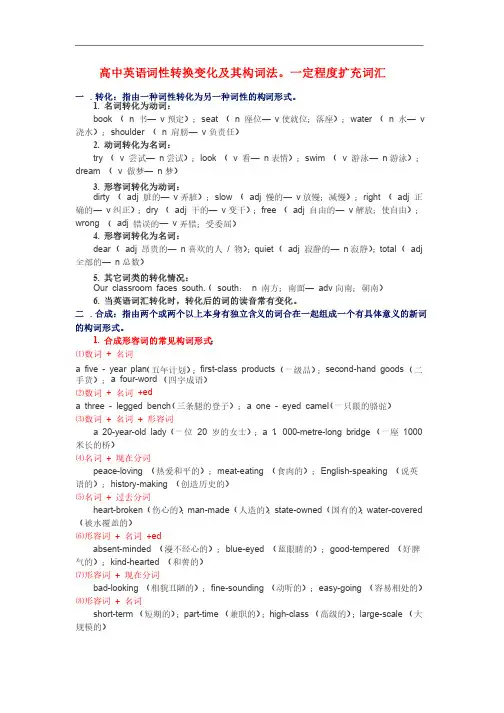
高中英语词性转换变化及其构词法。
一定程度扩充词汇一 . 转化:指由一种词性转化为另一种词性的构词形式。
1. 名词转化为动词:book (n 书— v 预定);seat (n 座位— v 使就位;落座);water (n 水— v 浇水);shoulder (n 肩膀— v 负责任)2. 动词转化为名词:try (v 尝试— n 尝试);look (v 看— n 表情);swim (v 游泳— n 游泳);dream (v 做梦— n 梦)3. 形容词转化为动词:dirty (adj 脏的— v 弄脏);slow (adj 慢的— v 放慢;减慢);right (adj 正确的— v 纠正);dry (adj 干的— v 变干);free (adj 自由的— v 解放;使自由);wrong (adj 错误的— v 弄错;受委屈)4. 形容词转化为名词:dear (adj 昂贵的— n 喜欢的人/ 物);quiet (adj 寂静的— n 寂静);total (adj 全部的— n 总数)5. 其它词类的转化情况:Our classroom faces south. (south:n 南方;南面— adv 向南;朝南)6. 当英语词汇转化时,转化后的词的读音常有变化。
二 . 合成:指由两个或两个以上本身有独立含义的词合在一起组成一个有具体意义的新词的构词形式。
1. 合成形容词的常见构词形式:⑴数词+ 名词a five - year plan (五年计划);first-class products (一级品);second-hand goods (二手货);a four-word (四字成语)⑵数词+ 名词+ed a three - legged bench (三条腿的登子);a one - eyed camel (一只眼的骆驼)⑶数词+ 名词+ 形容词a 20-year-old lady (一位(一位20 岁的女士);a 1,000-metre-long bridge (一座1000 米长的桥)⑷名词+ 现在分词peace-loving (热爱和平的);meat-eating (食肉的);English-speaking (说英语的);history-making (创造历史的)⑸名词+ 过去分词heart-broken (伤心的);man-made (人造的);state-owned (国有的);water-covered (被水覆盖的)⑹形容词+ 名词+ed absent-minded (漫不经心的);blue-eyed (蓝眼睛的);good-tempered (好脾气的);kind-hearted (和善的)⑺形容词+ 现在分词bad-looking (相貌丑陋的);fine-sounding (动听的);easy-going (容易相处的)⑻形容词+ 名词short-term (短期的);part-time (兼职的);high-class (高级的);large-scale (大规模的)⑼副词+ 现在分词hard-working (努力工作的);far-reaching (深远的);ever-lasting (永恒的)⑽副词+ 过去分词well-developed (高度发达的);well-known (著名的);well-trained (训练有素的)⑾其他构词形式的合成形容词all-round (全面的);face-to-face (面对面的);thank-you (感谢的);out-of-date (过时的)2. 合成名词的常见构成形式:①名词+ 名词silkworm (蚕);footprint (脚印);newspaper (报纸);glasshouse (温室);bedroom (卧室)②名词+ 动名词handwriting (书法);sun-bathing (日光浴);sight-seeing (观光)③形容词+ 名词shorthand (速记);hotline (热线);blackboard (黑板)④动名词+ 名词waiting-room (候车室);sleeping-pill (安眠药);writing-desk (写字台);reading-room (阅览室)⑤动词+ 名词pickpocket (扒手);post office (邮局);playground (操场);break-water (防波堤)⑥动词+ 副词get-together (联欢会);break-through (突破);take-off (起飞);lookout (岗哨)⑦副词+ 动词downfall (垮台);overthrow (推翻);outbreak (爆发);income (收入;所得)⑧其他构成形式的合成名词well-being (福利);good-for-nothing (无用之人);by-product (副产品);touch-me-not (含羞草);self-improvement (自我完善);self-criticism (自我批评)注意:合成词如果出现复数形式时通常在其后加-s 或-es ,如by-products,reading-rooms,但应特别注意:passers-by,lookers-on 等词语是在其表达该词中心含义的词上加-s 或-es . 3. 合成动词及其他合成词类:overthrow (推翻);sleep-walk (梦游);undergo (经历);everything (一切);furthermore (而且);forever (永远);maybe (也许)三.派生:指由一个词根加上前缀和(或)后缀构成另一个词的构词形式。
高中英语常用词词性转换及衍生
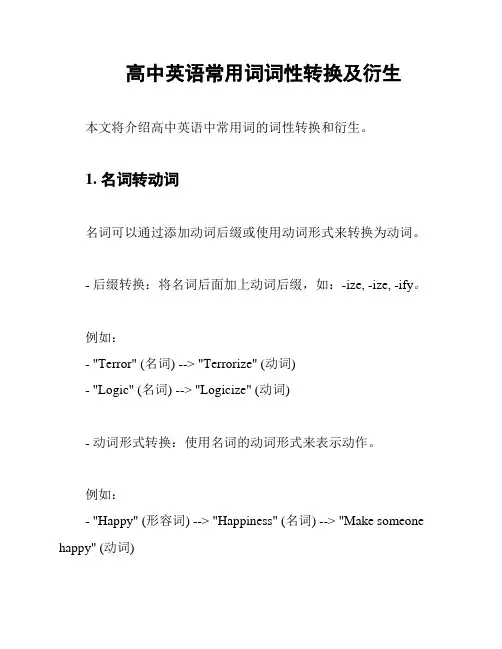
高中英语常用词词性转换及衍生本文将介绍高中英语中常用词的词性转换和衍生。
1. 名词转动词名词可以通过添加动词后缀或使用动词形式来转换为动词。
- 后缀转换:将名词后面加上动词后缀,如:-ize, -ize, -ify。
例如:- "Terror" (名词) --> "Terrorize" (动词)- "Logic" (名词) --> "Logicize" (动词)- 动词形式转换:使用名词的动词形式来表示动作。
例如:- "Happy" (形容词) --> "Happiness" (名词) --> "Make someone happy" (动词)2. 动词转名词动词可以通过添加名词后缀或使用名词形式来转换为名词。
- 后缀转换:将动词后面加上名词后缀,如:-tion, -ance, -ment。
例如:- "Perform" (动词) --> "Performance" (名词)- "Accept" (动词) --> "Acceptance" (名词)- 名词形式转换:使用动词的名词形式来表示状态或动作。
例如:- "Love" (动词) --> "Love" (名词) --> "Find love" (名词)3. 形容词转副词形容词可以通过添加副词后缀或使用副词形式来转换为副词。
- 后缀转换:将形容词后面加上副词后缀,如:-ly。
例如:- "Quick" (形容词) --> "Quickly" (副词)- "Easy" (形容词) --> "Easily" (副词)- 副词形式转换:使用形容词的副词形式来表示方式或程度。
【高中英语】必修1-必修5高中英语词性转换表
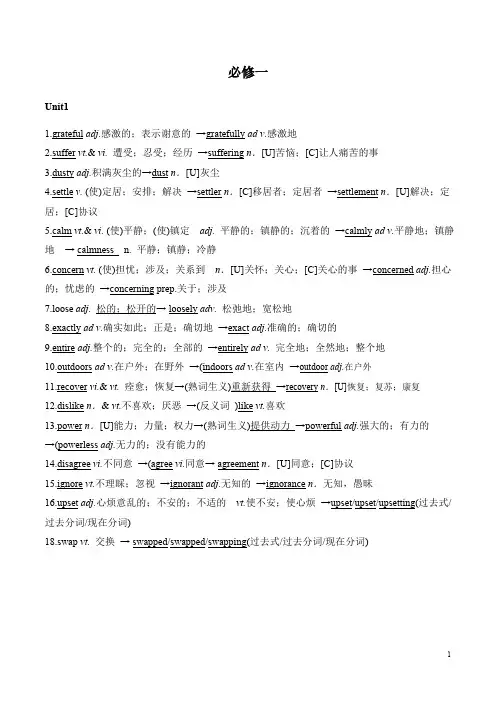
必修一Unit11.grateful adj.感激的;表示谢意的→gratefully ad v.感激地2.suffer vt.& vi.遭受;忍受;经历→suffering n.[U]苦恼;[C]让人痛苦的事3.dusty adj.积满灰尘的→dust n.[U]灰尘4.settle v. (使)定居;安排;解决→settler n.[C]移居者;定居者→settlement n.[U]解决;定居;[C]协议5.calm vt.& vi. (使)平静;(使)镇定 adj.平静的;镇静的;沉着的→calmly ad v.平静地;镇静地→ calmness n. 平静;镇静;冷静6.concern vt. (使)担忧;涉及;关系到 n.[U]关怀;关心;[C]关心的事→concerned adj.担心的;忧虑的→concerning prep.关于;涉及7.loose adj.松的;松开的→ loosely adv.松弛地;宽松地8.exactly ad v.确实如此;正是;确切地→exact adj.准确的;确切的9.entire adj.整个的;完全的;全部的→entirely ad v.完全地;全然地;整个地10.outdoors ad v.在户外;在野外→(indoors ad v.在室内→outdoor adj.在户外11.recover vi.& vt.痊愈;恢复→(熟词生义)重新获得→recovery n.[U]恢复;复苏;康复12.dislike n.& vt.不喜欢;厌恶→(反义词)like vt.喜欢13.power n.[U]能力;力量;权力→(熟词生义)提供动力→powerful adj.强大的;有力的→(powerless adj.无力的;没有能力的14.disagree vi.不同意→(agree vi.同意→ agreement n.[U]同意;[C]协议15.ignore vt.不理睬;忽视→ignorant adj.无知的→ignorance n.无知,愚昧16.upset adj.心烦意乱的;不安的;不适的 vt.使不安;使心烦→upset/upset/upsetting(过去式/过去分词/现在分词)18.swap vt.交换→ swapped/swapped/swapping(过去式/过去分词/现在分词)Unit21.eastern adj.东方的;东部的→ east adj.东方的adv. 向东方n. 东方;东部2.enrich vt. 使富裕;充实;改善→ rich adj. 富有的;富饶的;丰富的mand n.& vt.命令;指令;掌握→commander n.[C]指挥官4.base vt.以……为根据 n.[C]基部;基地;基础→basic adj.基本的;基础的→basically ad v.基本上;大体上5.recognize vt.辨认出;承认;公认→recognition n.[U]辨认;认出6.gradual adj.逐渐的;逐步的→gradually ad v.逐渐地;逐步地tter adj.较后的;后半的;(两者中)后者的→latest adj.最新的;最近的→later ad v.后来adj.后期的→lately ad v.近来;最近8.fluent adj.流利的;流畅的→fluently ad v.流利地;流畅地→fluency n.[U]流畅9.frequent adj.频繁的;常见的→frequently ad v.常常;频繁地→frequency n.[U]频率;频繁10.expression n.[C]词语;[U]表示;表达→express vt.表达;表示11.actually ad v.实际上;事实上→actual adj.实际的;真实的12.official adj.官方的;正式的;公务的 n.[C]官员→officially ad v.官方地;正式地Unit31.reliable adj.可信赖的;可靠的→reliably ad v.可依赖地;可靠地→rely vi.依靠;信赖2.stubborn adj.顽固的;固执的→ stubbornly adv.顽固地;倔强地→比较级stubborner →最高级stubbornest → stubbornness n. 顽固;棘手3.view n.[C,U]风景;视野;观点;见解 vt.观看;注视;考虑→ viewer n. 观看者;电视观众4.boil vi. (指液体)沸腾;(水)开→boiling adj.正在沸腾的;酷热的→boiled adj.煮沸的;煮熟的5.bend n.[C]弯;拐角 vt.使弯曲 vi.弯身;弯腰→bent/bent(过去式/过去分词)6.schedule n.[C,U]时间表;进度表 vt.为某事安排时间7.determine vt.决定;确定;下定决心→determined adj.坚决的;有决心的→determination n.[U]决心8.persuade vt.说服;劝说→persuasive adj.有说服力的→persuasion n.[U]说服9.prefer vt.更喜欢;选择某事物(而不选择其他事物) →preference n.[C]偏爱;爱好→过去式:preferred →过去分词: preferred →现在分词: preferring10.detail n.[C,U]细节;详情→detailed adj.详细的11.disadvantage n.[C]不利条件;不便之处→advantage n.[C]有利条件;优势anize vt.组织;成立→organizer n.[C]组织者→organization n.[C,U]组织→organized adj.有组织的13.graduate vi.毕业 n.[C]大学毕业生→graduation n.[C,U]毕业;毕业典礼14.finally ad v.最后;终于→final adj.最后的15.transport vt.运输;运送 n.[U]运送;运输→transportation n.运输;运输工具;运输系统Unit41.burst vi.爆裂;爆发 n.[C]突然破裂;爆发→burst/burst(过去式/过去分词)2.trap vt.使陷入困境 n.[C]陷阱;困境→过去式: trapped 过去分词: trapped 现在分词: trapping3.bury vt.埋葬;掩埋;隐藏→过去式: buried 过去分词: buried 现在分词: burying4.damage vt.损失;损害 n.[U]损失;[C]损害赔偿金→damageable adj.易损害的eless adj.无用的;无效的;无益的→useful adj.有用的6.destroy vt.破坏;毁坏;消灭→过去式: destroyed 过去分词: destroyed 现在分词: destroying7.sincerely ad v.真诚地;真挚地→sincere adj.真诚的;真挚的8.rescue n.& vt.援救;营救→rescuer n.[C]营救人员9.shock vt.& vi. (使)震惊;震动 n.[U]休克;[U,C]打击;震惊→shocking adj.令人震惊的→shocked adj.震惊的10.extreme adj.极度的→extremely ad v.极度;非常11.judge n.[C]裁判员;法官 vt.断定;判断;判决→judg(e)ment n.[U,C]意见;判断力;审判12.injure vt.损害;伤害→injury n.[C]伤害;损害→injured adj.受伤的13.frighten vt.使惊吓;吓唬→frightened adj.受惊的;受恐吓的→frightening adj.令人恐惧的14.congratulation n.[C]祝贺;(复数)贺词→congratulate vt.祝贺15.express vt.表示;表达 n.[C]快车;速递→expression n.[C]词语;[U]表示;表达16.nation n.民族;国家;国民→ national adj. 民族的;国家的→nationality n. 国籍;民族17.reporter n.记者→report n.报告;传闻;成绩单;爆炸声v.报告;报导18.cyclist n.骑自行车的人→cycle n. 循环;周期;自行车v.骑自行车Unit51.relative n.亲戚;亲属adj. 相对的;比较的→relatively adv.相对地;比较地→relation n.关系;联系;亲戚→related adj.相关的;有亲属关系的2.attack vt.&n.[C,U]进攻;攻击;抨击→ attacker n. 攻击者;抨击者3.escape vi.& vt.逃脱;逃走;避开→ escaper n. 逃出者4.violence n.暴力;暴行→ violent adj.猛烈的;强烈的;暴力的→violently adv. 猛烈地;强烈地;暴力地5.found vt.建立;建设→founded/founded(过去式/过去分词)6.beg vi.请求;乞求→beggar n.[C]乞丐7.equal adj.相等的;平等的→equality n.[U]平等;相等→equally ad v.同样地;相等地;公平地8.devote vt.献身;专心于→devoted adj.忠实的;深爱的→devotion n.[U]献身;奉献;忠诚9.reward n.[C,U]报酬;奖金 vt.酬劳;奖赏→rewarding adj.值得的;有益的;有回报的10.generous adj.慷慨的;大方的→generously ad v.慷慨地;大方地→generosity n.[U]大方;慷慨11.guidance n.[U]指导;领导→guide vt.指导;n.[C]向导;指南12.active adj.积极的;活跃的→actively ad v.积极地;活跃地→activity n.[C]活动13.peaceful adj.和平的;平静的;安宁的→peacefully ad v.和平地;平静地;安宁地→peace n.[U]和平;平静;和睦14.legal adj.法律的;依照法律的→(illegal adj.非法的;违法的→legally adv. 合法地cate vt.教育;训练→educated adj.受过教育的;有教养的→education n.[U]教育→educator n.[C]教育工作者;教育家16.self n.[C]自我;自身→selfish adj.自私的→selfless adj.无私的;忘我的→selflessly ad v.无私地;忘我地17.unfair adj.不公正的;不公平的→fair adj.公正的;公平的;相同的→fairly ad v.公正地;相同地;同样地18.willing adj.乐意的;自愿的→unwilling adj.不乐意的→willingness n.[U]乐意;自愿wyer n. 律师→law n.法律;法规20.hopeful adj. 有希望的→hopefully adv. 怀着希望地→hopeless adj. 没有希望的;绝望的→hopelessly adv. 绝望地;无望的必修二Unit11.worth prep.值得的;相当于……的价值n.[U]价值;作用 adj.[古]值钱的→worthless adj.无价值的;无用的→ worthy adj.有价值的2.sink vi.下沉;沉下→sank/sunk(过去式/过去分词)3.remove vt.移动;搬开→removal n.[C,U]移走;消除4.belong vi.属于;为……的一员→belongings n.(复数)所有物;财物5.design n.[C,U]设计;图案;构思 vt.设计;计划;构思→designer n.[C]设计师6.doubt n.[C,U]怀疑;疑惑 vt.怀疑;不信→doubtful adj.感到怀疑的;不确定的→undoubtedly ad v.确实地;毋庸置疑地7.amaze vt.使吃惊;惊讶→amazing adj.令人吃惊的→amazed adj.吃惊的→amazingly ad v.令人吃惊的是→amazement n.[C,U]惊奇8.survive vi.幸免;幸存;生还→survival n.[U]幸存;[C]残存物→survivor n.[C]幸存者9.valuable adj.贵重的;有价值的→value n.& vt.价值;重视10.select vt.挑选;选择→selection n.[C,U]选择11.evidence n.[U]根据;证据→evident adj.明显的;明白的→evidently ad v.明显地12.decorate v.装饰;装修→decoration n.[U]装饰;[C]装饰品13.explode vi.爆炸→explosion n.[C,U]爆炸(声);[C]爆发rmal adj.非正式的→(formal adj.正式的→formally ad v.正式地15.debate n.& vi.争论;辩论→ debatement n.辩论;讨论→ debater n.辩论家;讨论者Unit21.basis n.基础;根据→复数bases2.athlete n.运动员;运动选手→athletics n.体育运动;田径→athletic adj.运动的;活跃的3.deserve vi.& vt.应受(报答或惩罚);值得→deserver n.应得者; 应受者4.replace vt.取代;替换;代替→(熟词生义)放回原处→replaceable adj. 可置换的;可代替的5.swift adj.快的;迅速的→swiftly adv.迅速地;敏捷地→比较级: swifter →最高级: swiftestpete vi.比赛;竞争→competition n.[C,U]竞争;比赛→competitive adj.竞争的;有竞争性的→competitor n.[C]竞争者7.admit vt.& vi.容许;承认;接纳→admission n.[U]准入;准许8.volunteer n.[C]志愿者 adj.志愿的;义务的vt.& vi.自愿→voluntary adj.志愿的;自愿的9.regular adj.规则的;定期的;常规的→regularly ad v.经常地;规则地→(irregular adj.不规则的;不定期的10.physical adj.物理的;身体的→physically ad v.物理地;身体地→physics n.物理11.responsibility n.[C]责任;职责→responsible adj.有责任心的→responsibly ad v.负责任地12.advertise vt.& vi.做广告;登广告→advertiser n.[C]广告商→advertisement n.[C]广告13.host vt.做东;主办;招待 n.[C]主人→hostess n. [C]女主人;女房东14.pain n.[C,U]疼痛;痛苦→painful adj.痛苦的;疼痛的→painfully ad v.令人痛苦地;吃力地15.hopeless adj.绝望的→(hopeful adj.有希望的→hopefully ad v.充满希望地;有望Unit31.character n.性格;特点→ characteristic n. 特点;特性adj. 独特的,特有的2.technology n.工艺;科技;技术→ technological adj.科技的;工艺的3.analytical adj. 分析的→ analyze vt. 分析;解析4.arise vi.出现;发生→arose/arisen(过去式/过去分词)5.solve vt.解决;解答→solution n.[C]解决;解决办法6.simplify vt.简化→simplified adj.简化的→simple adj.简单的→simply ad v.简单地;仅仅7.intelligent adj.智能的;聪明的→intelligence n.[U]智力;聪明;智能8.total adj.总的;整个的 n.[C]总数;合计vt.共计;总计;把……加起来→totally ad v.完全地;整个地9.personal adj.私人的;个人的;亲自的→personally ad v.就个人而言;亲自→personality n.[C,U]个性;性格10.application n.[C,U]应用;用途;申请→apply v.应用;涉及;申请→applicant n.[C]申请人11.explore vt.& vi.探索;探测;探究→explorer n.[C]探险家;勘探者→exploration n.[U]探索12.appearance n.[C,U]外观;外貌;(常用单数)出现→appear vi.出现→(disappear vi.消失13.reality n.[U]真实;[C]事实→real adj.真实的→(unreal adj.不真实的→really ad v.真实地14.finance n.[U]金融;财政→financial adj.财政的;金融的→financially ad v.财政上;金融上15.logical adj.合逻辑的;合情理的→logically adv.逻辑上;合逻辑地16.happiness n.幸福;快乐→happy adj. 高兴的;幸福的17.supporting adj.支持的;支撑的→ support vt. 支持;支撑;供养n. 支持;支撑→ supporter n.支持者;拥护者18.type n.类型vt. & vi. 打字→ typist n. 打字员→typical adj.特有的;典型的→ typically adv.典型地19.electronic adj.电子的→ electronics n.电子学;电子器件→ electronical adj. 电子的20.mop n.拖把vt. 用拖把拖;擦→过去式: mopped →过去分词: mopped →现在分词: moppingUnit41.inspect vt.检查;视察→ inspection n.[C,U]检查2.certain adj.确定的;某一;一定→(uncertain adj.不确定的→certainty n.[U]确定3.hunt vt.& vi.打猎;猎取;搜寻→hunter n.[C]猎人4.decrease vi.& vt.减少;(使)变小或变少→ ( increase vi.& vt.增加→increasingly ad v.渐增地5.appreciate vt.鉴赏;感激→(熟词生义)意识到→appreciation n.[U]感激;感谢6.contain vt.包含;容纳;容忍→container n.[C]容器7.affect vt.影响;感动;侵袭→affection n.喜爱;感情→effect n.[C,U]影响;效果;作用8.succeed vi.成功 vt.接替;继任→success n.[C,U]成功→successful adj.成功的→successfullyad v.成功地9.employ vt.雇用;利用(时间、精力等) →employer n.[C]雇主→employee n.[C]雇员;雇工→employment n.雇用;使用;就业→(unemployment n.[U]失业;失业率10.respond vi.回答;响应;做出反应→ response n.[C,U]回答;反应11.distant adj.远的;远处的→ distance n.[C,U]距离;远方12.relief n.[U] (痛苦或忧虑的)减轻或解除;减轻痛苦的事物→relieve vt.使减轻;缓解13.harm n.[U]& vt.损害;危害→harmful adj.有害的→(harmless a dj.无害的14.protection n.[U]保护→ protect vt.保护→ protective adj.保护的;给予保护的15.mercy n.[U]仁慈;宽恕;怜悯→merciful adj.仁慈的;怜悯的→mercifully ad v.仁慈地;怜悯地16.importance n.[U]重要性→ important adj.重要的17. r eserve n.保护区 → reservation n.预定;保留意见18.wild adj.野生的;野的;未开发的;荒凉的→ wildly adv.狂热地;激动地19.threaten vt. & vi. 恐吓;威胁→threat n.威胁;恐吓20.endanger vt.危害;使受到危险→endangered adj.濒于灭绝的21.loss n.损失;遗失;丧失→ lose vt. 丢失;失败;削减(过去式: lost 过去分词: lost)ughter n.笑;笑声→ laugh v. 发笑;笑;嘲笑23.powerful adj.强大的;有力的→ power n. 力量;力;能力;权力→ powerfully adv.非常地;强有力地24.extinction n. 灭绝;消亡→extinct adj.灭绝的;熄灭的;消亡的→ extinctive adj.使消减的;消灭的25.fierce adj.凶猛的;猛烈的→fiercely adv.猛烈地;厉害地26.ending n.结局;结尾→ end n.结束;末端;目标;死亡v.终止27.faithfully adv. 忠诚地;忠实地→ faith n. 信仰;信念→faithful adj.忠诚的;忠实的Unit51.sensitive adj.敏感的;易受伤害的;灵敏的→ sensitively adv. 易感知地;神经过敏地→sense n. 感官;感觉;意识;鉴赏力;v. 感觉2.painful adj.痛苦的;疼痛的→ painfully adv. 痛苦地;苦恼地→pain n. 痛苦;疼痛3.form vt. (使)组成;形成;构成4.familiar adj.熟悉的;常见的;亲近的→familiarly adv.亲密地;亲热地→familiarity n.亲密;熟悉5.reunite vt. 再统一;再联合;重聚→ unite v.联合;合并6.broadcast n.& vi.& vt.广播;播放→broadcast/broadcast(过去式/过去分词)7.musician n.[C]音乐家→music n.[U]音乐→musical adj.音乐的8.invitation n.[C,U]邀请;招待→invite vt.邀请9.passer-by n.[C]过路人;行人→passers-by (pl.)10.perform vt.& vi.表演;履行;执行→performance n.[C,U]表演;演奏→performer n.[C]表演者11.rely vi.依赖;依靠→reliable adj.可靠的;可信赖的→reliably ad v.可靠地;可信赖地12.humorous adj.幽默的;诙谐的→humour n.[U]幽默13.attractive adj.吸引人的;有吸引力的→attract vt.吸引→attraction n.[U]吸引;吸引力;[C]吸引人的事物14.confident adj.自信的;确信的→confidently ad v.自信地;确信地→confidence n.自信;信任15.brief adj.简短的;简要的 n.[C]摘要;大纲→briefly ad v.简要地;短暂地16.devotion n.[U]投入;热爱→ devote vt.投入;热爱→devoted adj.献身的;忠诚的必修三Unit11.agriculture n.农业;农艺;农学→ agricultural adj.农业的2.gather vt.& vi.搜集;集合;聚集→ together adv. 共同;一起;协调3.obvious adj.明显的;显而易见的→obviously ad v.明显地;显而易见地4.remind vt.提醒;使想起→reminder n.[C]起提醒作用的东西5.apologize vi.道歉;辩白→apology n.[C]道歉6.origin n.[C,U]起源;由来;起因→original adj.原先的;最初的;新颖的 n.[C]原作;原稿→originally ad v.最初地;原先地7.starve vi.& vt. (使)饿死;饿得要死→starvation n.[U]饿死8.celebration n.[C,U]庆祝;祝贺→celebrate v.庆祝;祝贺9.belief n.[U]信任;信心;[C]信仰→believe v.相信;认为;信任10.independent adj.独立的;自主的→(dependent adj.依赖的→independence n.[U]独立;自主11.energetic adj.充满活力的;精力充沛的;积极的→energy n.[C]能量;(常用复数)精力12.admire vt.赞美;钦佩;羡慕→admiration n.[U]羡慕→admirable adj.令人羡慕的13.permission n.[U]许可;允许→permit vt.允许 n.[C]许可证;执照14.forgive vt.原谅;饶恕→forgave/forgiven(过去式/过去分词)→forgiveness n.[U]宽恕;原谅15.trick n.[C]诡计;恶作剧;窍门vt.欺骗;诈骗→tricky adj.棘手的;难对付的16.wipe vt.擦去;擦→过去式: wiped 过去分词: wiped 现在分词: wiping17.religious adj.宗教上的;信奉宗教的;虔诚的→religion n. 宗教;宗教信仰18.seasonal adj. 季节的;季节性的→ season n.季节;赛季19.arrival n.到来;到达;到达者→arrive vi.到达;到来20.fool n. 愚人;白痴;受骗者adj.傻的vt. 愚弄;欺骗vi.干傻事;开玩笑→ foolish adj. 愚蠢的;荒谬的21.permission n. 许可;允许→permit n.许可证;执照v. 允许;许可22.prediction .n.预言;预报;预告→ predict v.预言;预报→ predictive adj. 预言的;预兆的23.sadness n. 悲哀;悲伤→sad adj.悲哀的;忧愁的→ sadly adv.悲哀地→ sadnessn.悲哀24.weep vi. 哭泣;流泪n. 哭;哭泣→过去式: wept →过去分词: wept →现在分词: weepingUnit21.digest vi.& vt.消化 n.摘要;概要→ digestion n.消化;吸收;领悟2.cooperation n.合作;协作→ cooperate vi.合作;协力3.slim vi.变细;减肥adj.苗条的;纤细的→比较级: slimmer →最高级: slimmest4.lie n.[C] 谎话;谎言 vi.说谎→lied/lied/lying(过去式/过去分词/现在分词)5.consult vt.咨询;请教;商量→consultant n.[C]顾问6.balance n.[C]天平;[U]平衡 vt.平衡;权衡→balanced adj.均衡的7.benefit n.[C]利益;好处 vt.& vi.有益于;有助于;受益→beneficial adj.有益的8.limit n.[C,U]界限;限度 vt.限制;限定→limited adj.有限的9.curiosity n.[U]好奇心→curious adj.好奇的→ curiously ad v.好奇地10.strength n.[U]力量;[C]长处;强项→ strong adj.强壮的→strengthen vt.加强11.weakness n.[C]缺点;弱点;[U]虚弱→weak adj.虚弱的→weaken vt.削弱bine vt.& vi. (使)联合;(使)结合→combination n.[C,U]联合;结合13.sugary adj.含糖的;甜的→ sugar n. 糖,食糖14.poisonous adj. 有毒的→ poison n.毒药;毒害;败坏道德之事vt. 毒害Unit31.genuine adj.真的;真诚的→ genuinely adv. 真正地;诚实地2.rude adj.粗鲁的;无礼的→rudely ad v.粗鲁地;无礼地→rudeness n.[U]粗鲁3.unbelievable adj.难以置信的→( believable adj.可信的→ believe v.相信;信任→belief n.[U]信念;[C]信仰4.contrary n.[C] 反面;对立面 adj.相反的;违反的5.seek vt.& vi.寻找;探索;寻求→ sought/sought(过去式/过去分词)6.spot vt.发现;认出 n.[C] 斑点;污点;地点→ spotted adj.有污迹的;有斑点的7.account vi.& vt.认为;说明;总计有 n.[C]说明;理由;计算;账目→accountant n.[C]会计8.adventure n.奇遇;冒险→adventurous adj.冒险的9.permit vt.& vi.许可;允许;准许 n.[C]通行证;许可证;执照→permission n.[U]许可10.novel n.[C]小说;长篇故事→(熟词生义) adj.新奇的;异常的→novelist n.小说家11.patience n.[U]耐性;忍耐→patient adj.忍耐的;有耐心的→patiently ad v.耐心地→impatient adj.不耐烦的Unit41.astronomy n.天文学→astronomer n.天文学家2.globe n.球体;地球仪;地球→ global adj.全球的;全世界的→globally adv.全球地3.pull n.& vt.拉(力);拖;牵引力→puller n. 拉的人;划手4.reaction n. 反应;回应→ react v.反应;反攻5.theory n.[C]理论→theoretical adj.理论上的→theoretically ad v.理论上地6.fundamental adj.基本的;基础的→fundamentally ad v.基本地;基础地7.system n.[C] 系统;体系;制度→systematic adj.有系统的→systematically ad v.系统地8.harmful adj.有害的→harmless adj.无害的→harm n.[U]害处 vt.对……有害9.violent adj.猛烈的;激烈的;强暴的→violence n.暴力→violently ad v.猛烈地;激烈地10.puzzle vt.& vi. (使)迷惑;(使)为难 n.[C]谜;难题→puzzling adj.令人迷惑的→puzzled adj.迷惑不解的11.unlike prep.不同;不像→(like prep.像→dislike v.&n.[C]不喜欢12.exist vi.存在;生存→existence n.[U]存在→existing adj.现存的13.gentle adj.温和的;文雅的→gently ad v.温和地;轻柔地14.biology n.生物→biologist n.[C]生物学家15.exhaust vt.用尽;耗尽;使精疲力尽→ exhausted adj. 用完的;精疲力竭的→exhausting adj.疲倦的;筋疲力尽的→ exhaustion n.疲惫;筋疲力尽16.extinct adj.灭绝的;绝种的→ extinction n. 消失;消减→ extinctive adj.使消减的;消灭的17.prevent v. 预防;防止→ prevention n.阻止;妨碍→ preventive adj.预防的;防病的18.physicist n. 物理学家→physics n.物理学→ physical adj.物质的;身体的;体力的;物理的→ mental adj. 思想的;心理的Unit51.prime adj. 首要的;主要的;基本的→ primely adv. 最初地;很好地2.measure vi.& vt.测量;衡量;判定 n.[C, U] 计量单位;措施→ measurable adj. 可测量的3.polar adj.极地的;近极地的→pole n.杆;柱;极点v. (用杆)支撑4.chat vi.&n.聊天;闲聊→chatted/chatted/chatting(过去式/过去分词/现在分词)5.baggage n.[U]行李→(同义词)luggage6.mix vt.& vi.混合;调配→mixture n.混合(物);混合状态→mixed adj.混合的;混杂的7.distance n.[C, U]距离;远方→distant adj.远的;远方的8.wealthy adj.富有的→wealth n.[U]财富9.terrify vt.使恐怖;恐吓→terrified adj.感到恐惧的;受惊吓的→terror n.[U]恐惧;[C]引起恐惧的人或物→terrifying adj.可怕的10.impress vt.使印象深刻;使铭记→impressive adj.给人深刻印象的;感人的→impression n.[C]印象11.surround vt.& vi.包围;围绕→surroundings n.(复数)周围的事物;环境→surrounding adj.周围的12.slight adj.轻微的;微小的→slightly ad v.稍稍;轻微地13.tradition n.[C, U]传统;风俗→traditional adj.传统的→traditionally ad v.传统上14.pleased adj.欣喜的;高兴的;愉快的→pleasing adj.令人愉快的→pleasant adj.令人愉快的→pleasure n.[U]快乐;[C]令人高兴的事15.mist n.薄雾→ misty adj. 有薄雾的;模糊的必修四Unit11.entertainment n.款待;娱乐;娱乐表演→ entertain v. 娱乐;使有兴趣→entertainer n.表演娱乐节目的人;演艺人员2.specialist n.专家;专业工作者→ specialize v. 专攻3.respect vt.&n.尊敬;尊重;敬意→(熟词生义)遵守→respectable adj.值得尊敬的;体面的→respectful adj.恭敬的;有礼貌的4.argue vt.& vi.讨论;辩论;争论→argument n.[C, U]争论;争辩;争吵5.behave vt.& vi.举动;表现→behaviour n.[C, U]行为;举止;习性6.observe vt.观察;观测;遵守→(熟词生义)庆祝→observation n.[U]观察;观测7.intend vt.计划;打算→intention n.[C, U]目的;意图8.support n.& vt.支持;拥护→supportive adj.支持的→supporter n.[C]支持者9.achievement n.[C]成就;功绩→achieve vt.取得;实现10.connection n.[C]连接;关系→connect vt.联系→connected adj.有联系的11.crowd n.[C]人群;观众 vt.挤满;使拥挤→crowded adj.拥挤的12.refer vi.谈到;查阅;参考→reference n.[U]查阅;参考13.inspire vt.鼓舞;激发;启示→inspiring adj.鼓舞人心的→inspired adj.受鼓舞的→inspiration n.[U]灵感;鼓舞14.considerate adj.考虑周到的→consider vt.考虑;体谅→consideration n.[U]考虑;体谅15.deliver vt.递送;生;接生;发表→delivery n. [U]递送→ deliverer n.投递者anization n.[C]组织;机构;团体→organize vt.组织→organized adj.有组织17.emergency n.突发事件;紧急情况→ emergent adj. 出现的;紧急的emergence →n.出现;浮现18.determination → n.决心;果断→ determine v.决定;决心→ determined adj.坚定的;坚决的19.kindness n.仁慈;好意→kind adj.亲切的;善良的n. 种类;本质→ kindly adv. 温和地;亲切地Unit21.occupation n.工作;职业;占领→ occupy vt. 占用;占领;从事2.personality n.性格;个性;人格→ personal adj. 私人的;个人的→personally adv. 就个人而言3.industrial adj.工业的;产业的→ industry n.工业;产业4.regret vt.遗憾;懊悔 n. [C,U] 遗憾;懊悔→ regretful adj. 惋惜的;遗憾的ment n.[C,U]评论;议论 vi.& vt.表达意见;作出评论→ commenter n.批评家6.expand vt.& vi.使变大;伸展→expansion n. [C,U] 扩大;扩张;扩充7.focus n.[C,U] 焦点;中心点 vt.集中;聚焦→focus(s)ed adj.专注的;注意力集中的8.equip vt.& vi.配备;装备→equipment n.[U]设备→equipped adj.有装备的9.confuse vt.使迷惑;使为难→confusing adj.令人迷惑的→confused adj.感到迷惑的→confusion n.[U]迷惑10.disturbing adj.引起烦恼的;令人不安的→disturbed adj.烦恼的→disturb vt.扰乱;打扰11.freedom n.[U]自由;自主→free adj.自由的;免费的→freely ad v.自由地12.export vt.& vi.输出;出口→(import vt.& vi.输入;进口13.reduce vt.减少;减缩→(increase v.增加→ reduction n. 减少;降低14.discovery n.[C]发现;发觉→discover vt.发现;发觉→discoverer n.[C]发现者15.hunger n.[U]饥饿;(常用单数)欲望 vt.& vi. (使)饥饿→hungry adj.饥饿的→hungrily ad v.饥饿地;贪婪地16.nationality n. [C]国籍→national adj.国家的;民族的→nation n. [C]民族;国家17.producer n.生产者;制片人→ produce v. 生产;引起;提出n. 产品→production n.生产;产量;作品→ productive adj.生产的;多产的Unit31.content adj.& vt.满足的;满意的;满足;使满足 n.[C]内容;[U]满足edy n.喜剧→( tragedy n. 悲剧;灾难3.overcome vt.& vi.战胜;克服→overcame/overcome(过去式/过去分词)4.astonish vt.使惊诧→astonishing adj.令人感到惊讶的→astonished adj.惊讶的5.convince vt.使信服→convincing adj.令人信服的→convinced adj.确信的;深信的6.direct vt.& vi.导演;指示;指挥 adj.直的;直接的;直率的→directly ad v.直接地;立刻地→direction n.[C,U]方向;[U]指导;(常用复数)指示;用法说明→director n.[C]导演7.depressed adj.忧愁的;沮丧的→depressing adj.使人沮丧的→depression n.[C,U]沮丧;不高兴8.fortune n.[U]幸运;[C]财富→fortunate adj.幸运的;吉利的→fortunately ad v.幸运地→(unfortunately ad v.不幸地9.entertain vt.& vi.使欢乐;款待→entertaining adj.愉快的;有趣的→entertainment n.[U]款待;[C]娱乐节目10.particular adj.特殊的;特别的 n.[C]细节;细目→particularly ad v.尤其;特别地11.humour n.[U]幽默;滑稽→humorous adj.幽默的12.bored adj.厌烦的→boring adj.令人厌烦的13.performer n.[C]表演者;演出者→perform v.执行;表演→performance n.[C]演出;[U]表现14.failure n.[U]失败;[C]失败者;失败的事→fail v.不能;失败;不及格;衰退;使失望15.brighten vt.使更愉快;使更有希望→ bright adj.明亮的;聪明的→ brightness n. 光亮;明亮→brightly adv. 生辉地;明亮地16.confidence n.信心;信念→ confident adj. 自信的→ confidently adv.有信心地17.occasion n. 时刻;场合→occasional adj. 偶然的;临时的→ occasionally adv. 偶尔地18.amuse vt.使发笑;使愉快→amusing adj. 好笑的;有趣的→amused adj. 愉快的;被逗乐的→amusement n.乐趣,娱乐19.explanation n.解释;讲解;说明→ explain v. 说明;解释20.mountainous adj.多山的;山一般的→mountain n. 大量;山21.react vi.作出反应;回应→ reaction n. 反应→ reactive adj. 反应的;反作用的22.drunk adj.醉的→ drink v. 喝;饮n.饮料;酒;喝酒Unit41.simply adv.简单地;只→ simple adj. 简单的→ simplify vt. 简化2.major adj.主要的→ majority n.大多数;多数3.ease n.安逸;舒适 vt.减轻(痛苦、忧虑) → easy adj.容易的;轻松的→easily adv. 容易地→easiness n. 容易;轻松4.approach vt.& vi.接近;靠近;走近 n. [U]接近;[C]方法;途径→approachable adj.平易近人的;可到达的5.represent vt.代表;象征→ representative n.代表 adj.典型的;有代表性的6.curious adj.好奇的→ curiously ad v.好奇地→curiosity n.[U]好奇心7.defend vt.保护;保卫→defence n.[U]防御;保卫→defenceless adj.无防御的8.facial adj.面部的→face n.[C]脸;面容→ faceless adj.匿名的;无名的;没脸面的9.misunderstand vt.误解;误会→misunderstood/misunderstood(过去式/过去分词)→misunderstanding n.[U]误解;误会10.anger n.怒气;怒火→angry adj.生气的→angrily ad v.生气地11.greet vi.& vt.迎接;问候→greeting n.[U]迎接;招呼;问候(常用复数)12.spoken adj.口语的→(unspoken adj.未说出口的;非口语的13.truly ad v.真实地;真诚地;真正地→true adj.真实的→truth n.[U]真实;(用作单数)真相;事实14.statement n.[C]陈述;说明→state v.陈述;说明15.association n.社团;联系;联想→associate vt.把……联系起来→associated adj.有关的;相关的16.subjective adj.主观的→ subject n.话题;科目;主题;题材;主观→ objective adj.客观的;真实的Unit51.tourism n.[U]旅游业→tour n. [C]旅行 vt.旅行;巡回演出→tourist n. [C]游客2.preserve vt.保存;保留 n.[C]保护区→preservation n.保存;维护3.swing n.[C] 秋千;摇摆 vt.& vi.摇摆;摆动→swung/swung(过去式/过去分词)4.advance vt.& vi.前进;提前 n.[U]前进;[C]进步→advanced adj.高级的;先进的5.various adj.不同的;各种各样的→variety n.[C]变化;多样性→vary vi.改变6.length n.[U]长度;长→lengthen v.加长→long adj.长的7.settler n.[C]移民;殖民者→settle vt.& vi.安家;定居;解决→settlement n.[U]定居;解决8.admission n.[U]允许进入;入场费;承认→admit v.承认9.amusement n.[U]消遣;[C]娱乐(活动)→amuse vt.使发笑;使快乐10.attraction n.[C]有吸引力的事物;[U]吸引→attract vt.吸引→attractive adj.吸引人的11.minority n.[C]少数;少数民族→(majority n.(常用单数)多数12.athletic adj.运动的→athlete n. [C]运动员13.fantasy n.[C]幻想;怪念头→fantastic adj.极好的;了不起的;不现实的必修五Unit11.suspect vt.认为;怀疑 n.被怀疑者;嫌疑犯→ suspectful adj.怀疑的2.enthusiastic adj.热情的;热心的→ enthusiasm n. 热情;热心→ enthusiastically adv. 热情地3.attend vt.照顾;护理;出席→(熟词生义)处理→attendance n.出席;出席人数→ attendant adj.出席的;护理的4.cure vt.&n.[C] 治愈;痊愈;治疗→(熟词生义)矫正→ cureless adj.医不好的5.positive adj.积极的;肯定的;确实的→positively adv.积极地;断然地;肯定地→negative adj. 否定的;消极的6.deadly adj. 致命的→ dead adj.死的→ death n. 死;死亡→ die v. 死7.infect vt. 传染;感染→infectious adj.传染的8.spin vi.& vt. (使)旋转;纺(线或纱)→spun/spun/spinning(过去式/过去分词/现在分词)9.expose vt.暴露;揭露→(熟词生义)使曝光→exposure n.[C,U]暴露;揭发10.conclude vt.& vi.推断出→(熟词生义)结束→conclusion n.[C]结论;[U]结束11.contribute vt.& vi.捐献;贡献;捐助;投稿→contribution n.[C]贡献12.instruct vt.命令;指示;教导→instruction n.[U]教育;指导→instructions (pl.)用法说明;操作指南→instructive adj.富有教育意义的;启发的13.announce vt.宣布;通告→announcement n.[C]通知;宣告→announcer n.[C]播音员14.challenge n.[C,U]挑战 vt.向……挑战→challenging adj.挑战性的15.construct vt.建设;修建→construction n.[U]建设;[C]建筑物16.pollute vt.污染;弄脏→pollution n.[U]污染→polluted adj.被污染了的17.reject vt.拒绝;不接受;抛弃→rejection n.[U]拒绝;抛弃18.scientific adj.科学的→scientifically ad v.科学地→science n.科学→scientist n.[C]科学家19.absorb vt.吸引;吸收;使专心→ absorbed adj.专心致志的;全神贯注的20.universe n.宇宙;世界→ universal adj. 普遍的;全世界的→universally adv. 普遍地21.severe adj.严重的;剧烈的;严厉的→ severely adv.严格地;严重地→比较级: severer →最高级: severest22.investigate vt. & vi. 调查→investigation n. 调查23.privately adv. 私下地;秘密地private adj.私人的;个人的24.brightness n.明亮;亮度;聪颖→ bright adj.明亮的;聪明的→ brighten v.使变亮;使生辉;发亮25.creative adj.有创造力的;创造性的;独创的→ creatively adv. 创造性地→create v.创造→ creation n.创造;创作Unit21.accomplish vt.完成;达到;实现→accomplishment n.[C]成就;[U]完成2.arrange vt.筹备;安排→(熟词生义)整理→arrangement n.[C]安排;布置;整理3.attract vt.吸引;引起注意→attraction n.[U]吸引;吸引力;[C]有吸引力的人/物→attractive adj.有吸引力的4.convenience n.[U]便利;方便;[C]便利设施→convenient adj.方便的→( inconvenient adj.不方便的5.consist vi.组成;在于;一致→consistent adj.一致的6.delight n.[U]快乐;高兴;[C]乐事 vt.使高兴;使欣喜→delighted adj.高兴的;快乐的→delightful adj.令人高兴的7.description n.[C,U]描写;描述→describe vt.描述;形容;描绘8.enjoyable adj.愉快的;快乐的→enjoy vt.享受→enjoyment n.[U]享受;[C]乐事9.fold vt.折叠;对折→( unfold vt.展开;打开10.furnished adj.带家具的→furnish vt.装修;布置→furniture n.[U]家具11.possibility n.[C,U]可能(性) →possible adj.可能的→( impossible adj.不可能的→possibly ad v.可能地12.thrill vt.使激动;使胆战心惊→thrilled adj.激动的→thrilling adj.令人激动的13.collection n.[C]收藏品;专辑;[U]收集→collect vt.收集;聚集;募捐14.unwilling adj.不乐意的→(willing adj.乐意的→willingly ad v.乐意地15. r ough adj.粗糙的;粗暴的→roughly adv.粗略地;粗糙地→比较级: rougher →最高级: roughest。
高中英语新高考词性转换汇总(共五组)
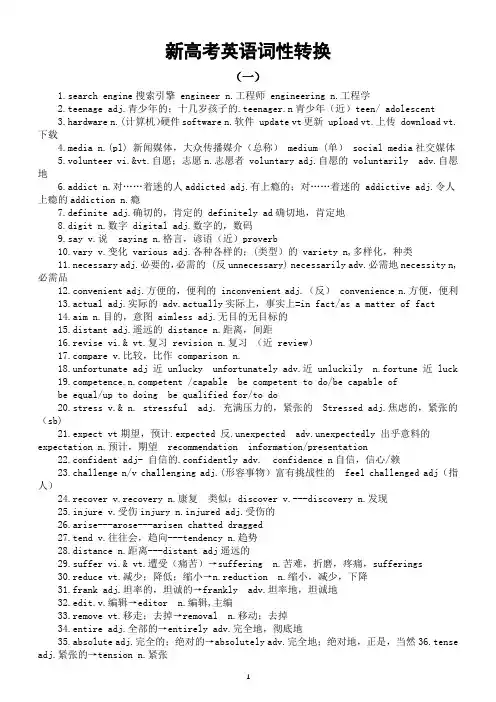
新高考英语词性转换(一)1.search engine搜索引擎 engineer n.工程师 engineering n.工程学2.teenage adj.青少年的;十几岁孩子的.teenager.n青少年(近)teen/ adolescent3.hardware n.(计算机)硬件software n.软件 update vt更新 upload vt.上传 download vt.下载4.media n.(pl) 新闻媒体,大众传播媒介(总称) medium (单) social media社交媒体5.volunteer vi.&vt.自愿;志愿n.志愿者 voluntary adj.自愿的 voluntarily adv.自愿地6.addict n.对……着迷的人addicted adj.有上瘾的;对……着迷的 addictive adj.令人上瘾的addiction n.瘾7.definite adj.确切的,肯定的 definitely ad确切地,肯定地8.digit n.数字 digital adj.数字的,数码9.say v.说 saying n.格言,谚语(近)proverb10.vary v.变化 various adj.各种各样的;(类型)的 variety n,多样化,种类11.necessary adj.必要的,必需的 (反unnecessary) necessarily adv.必需地necessity n,必需品12.convenient adj.方便的,便利的 inconvenient adj.(反) convenience n.方便,便利13.actual adj.实际的 adv.actually实际上,事实上=in fact/as a matter of fact14.aim n.目的,意图 aimless adj.无目的无目标的15.distant adj.遥远的 distance n.距离,间距16.revise vi.& vt.复习 revision n.复习(近 review)pare v.比较,比作 comparison n.18.unfortunate adj 近 unlucky unfortunately adv.近 unluckily n.fortune 近 luckpetent /capable be competent to do/be capable ofbe equal/up to doing be qualified for/to do20.stress v.& n. stressful adj. 充满压力的,紧张的 Stressed adj.焦虑的,紧张的(sb)21.expect vt期望,预计.expected 反.unexpected adv.unexpectedly 出乎意料的expectation n.预计,期望 recommendation information/presentation22.confident adj- 自信的.confidently adv. confidence n自信,信心/赖23.challenge n/v challenging adj.(形容事物)富有挑战性的 feel challenged adj(指人)24.recover v.recovery n.康复类似:discover v.---discovery n.发现25.injure v.受伤injury n.injured adj.受伤的26.arise---arose---arisen chatted dragged27.tend v.往往会,趋向---tendency n.趋势28.distance n.距离---distant adj遥远的29.suffer vi.& vt.遭受(痛苦)→suffering n.苦难,折磨,疼痛,sufferings30.reduce vt.减少;降低;缩小→n.reduction n.缩小,减少,下降31.frank adj.坦率的,坦诚的→frankly adv.坦率地,坦诚地32.edit.v.编辑→editor n.编辑,主编33.remove vt.移走;去掉→removal n.移动;去掉34.entire adj.全部的→entirely adv.完全地,彻底地35.absolute adj.完全的;绝对的→absolutely adv.完全地;绝对地,正是,当然36.tense adj.紧张的→tension n.紧张anise vt.组织,筹划→organisation n.团体,机构,组织38.profession n.专业→professional adj.专业的,职业的39.type n.类型,种类→typical一贯的,典型的,平常的→typically adv.vt.打字,输入→typist n.打字员→typewriter n.打字机40.apply vi.申请;请求→applicant n.申请人→ application n.申请;请求41.inspire vt.鼓励,激励→inspired adj.鼓舞人的→inspiration n.灵感,鼓舞42.mud n.泥→ muddy adj.泥泞的,多泥的ugh v.笑→laugh[c]/laughter [u] n.笑,笑声44.intend vt.计划,打算,想要→intention n.意图,目的,打算45.eager adj.热切渴望的→eagerness n.热切,渴望→eagerly adv.热切渴望地46.attract v.吸引→attractive adj.好看的,美观的→attraction n.向往的地方47.power n.电,电力力量→powerful adj.强大的;有力的48.stable adj.稳定的→stably adv稳定地反义词:unstable adj.不稳定的49.contribute v.捐献,捐助→contribution n.捐献,捐助50.depend v.依赖,依靠→dependence n.依赖,依靠→dependent adj独立的,自立的→dependently adv.独立地反义词:independent adj独立的,自立的51.dust n.灰尘→dust vt.去除...灰尘→dusty adj.布满灰尘的52.form n.形式;表格/v.组成;建立;组织formal adj.正式的,官方的→informal adj.非正式的(official adj/n.→ officially adv)53.adapt vi.(使)适应→adaptable adj.能适应的,适应性强的→adaptive adj.适应的,有适应能力的→adaptation n.适应;改编版(adopt采纳;收养)54.presentation n.报告;陈述,说明→present(vt)介绍;颁发,授予,赠送;描述:展现n礼物;目前;现在(adj.)当前的;现存的;在场的;出席的;存在的55.digestion n.消化→digest vt.消化;理解,领悟n.摘要;概要;文摘56.entertainment n.娱乐→entertain vt.& vi.使有兴趣;使快乐→entertaining adj.使人愉快的,有趣的57.practice熟词生义n.[U,C]通常的做法,惯例,常规→practise doing sth58.weary adj.疲倦的 weary travellers疲惫不堪的旅行者wear(wore,worn)59.forward adv.向前;进展(backward)back wards and forward(s)来来回回60.recreation n.U 娱乐,消遣C 娱乐活动,游戏(pastime/entertainment/amusement)61.rural adj.农村的,乡村的,田园的 in a rural area在乡村地区(in the countryside)urban adj 城市的suburban adj 郊区的,城郊的 downtown adj/n 市中心的,商业区(二)1.frequency n 发生的频率,发生率,frequent 频繁的,经常发生的,frequently adv 频繁地prefer vt 更喜欢 preference n 偏好,爱好balanced adj 均衡的 balance n 均衡,平衡,天平 vt 使平衡4.inspiration n 激励,鼓舞,灵感;给人以灵感的人或物 inspire vt 激励,鼓舞,激起;给...创作灵感 inspired adj 卓越的,品质优秀的;受到启发的 inspiring adj 激励的,鼓舞人心的;启发灵感的5.replacement n 替换的人或物 replace vt 取代,替换6.gather v 聚集,集合 gathering n 聚集,聚会7.sharply adv 严厉地,毫不客气地 sharp adj 锋利的,敏锐的 sharpen v 使变锋利,尖锐 sharpener n卷笔刀,磨具,削具8.energy n 力量,活力 energetic adj 精力充沛的,充满活力的 energetically adv 精力充沛地9.crowd n 人群 crowded adj 拥挤的10.cycle vi 骑自行车 cyclist n骑自行车者,自行车运动员 cycling n骑自行车活动11.regular adj 定期的,规则的n 常客,老主顾 regularly adv 经常地,定期地12.athlete n 运动员,擅长运动的人 athletic adj 体育运动的,健壮的13.announcement n.通告,公告→ announce v.宣布→ announcer n.播音员,节目主持人14.defence n.保护;辩解;防守队员→defend v.保护;为......辩护→defensive 防御性的15.prohibit v.禁止→ prohibition n.禁止 (同义词:ban/forbid)16.apply v.申请;应用;→application n.申请(书);应用→ applicant n.申请人17.occupy v.占用;占领;使忙于→occupied adj.忙于......的;(床、椅子、房间等)被占用的→occupation n.职业(career/profession);消遣;占领19, disappointment n.失望→ disappoint v.使......失望;使破灭→ disappointed (人)感到失望的 disappointing (物)令人失望的20amazingly adv.惊人地→amaze v.使吃惊→ amazement n.吃惊→amazed (人)感到吃惊的 amazing (物)令人吃惊的21.relieve v.减轻、缓解→ relived 感到宽慰的,感到放心的→ relief n.宽慰;缓解;救济22.Strengthen v.加强;增强→strength n.体力;优点,长处;毅力;实力→strong 强壮的 frighten 使害怕 lengthen 变长 shorten 变短 weaken 变弱 deepen 加深 widen 加宽 sharpen 变锋利23.particular n.尤其、特别 adj.特别的;挑剔的→ particularly adv.特别,尤其24.benefit v.使收益 n.好处,益处→ beneficial 有好处的,有益处的25. equipment un.设备,装备(a piece of equipment一套设备)→ equip v.配备、装备;使某人有所准备26.capable adj.能干的、能力强的(同义词:competent)→capability n.能力(competence)27.achievable 可完成的,可实现的→ achieve v.实现;获得;完成→achievement n.成就(a sense of achievement一种成就感)satisfaction n.满意,满足→ satisfy 使满意→ satisfied (人)感到满意的satisfying(物)令人满意的(=satisfactory)28.detail n 细节 v. 详细叙述 ---detailed adj 详细的29.flexibility n 灵活性 flexible adj 灵活的30.amaze vt.使惊讶→amazed adj.惊讶的→amazing adj. 令人惊讶的→amazement n.31.overtake → overtook → overtaken 超过,赶上overcome → overcame→ overcome 战胜,克服overdo → overdid → overdone 做得过分,过度使用become → became → become 变得welcome → welcomed → welcomed 欢迎32.response n.回复→ respond v.→ responsible adj.负责任的→ responsibly adv.→responsibility n.责任33.defend v.保卫→ defence/defense n.→ defensive adj.防御的,戒备的offend v.冒犯→ offence/offense n.→ offensive adj.无礼的,冒犯的34.flexibility n.灵活性→ flexible adj.灵活的→ flexibly adv.→ inflexible adj.僵化的35.key【熟词生义】当成最重要的事情考虑,排在第一key in on sth.将事情当成最重要的事36.to the point of (doing) sth 达到某种程度37.involve vt.使参加,加入→ involvement n.参与,加入38.sprint n.冲刺39.line 沿...形成行(或排、列) finishing line = finish line 终点线40.cyclist n.骑自行车的人→ cycle v.骑自行车;n.循环→ cycling n.骑自行车(运动) →bicycle n.自行车41.bronze medal 铜牌; gold medal 金牌; silver medal 银牌42.certified adj.有专业资格的→ certificate n.合格证书pete v.比赛,竞争→ competition n.→ competitive adj.有竞争力的→ competitor n.竞争者(opponent n.对手)44.originate vi.起源,发源originate in+地点源自某地; originate from sth源自某物45.imply暗示,暗指,说明 (infer v.推断)46.catch the attention of sb = catch one's attention引起某人的注意47.famed adj.著名的be famed/ famous/ known/ remarkable/ celebrated for 因...而著名bine vt/vi(使)结合,联合→ combination [U]联合combine sth with/and sth 把...与...结合49.work out 锻炼身体,做运动 workout n.锻炼50.impact n.冲击力,巨大影响 have an impact/ influence/ effect on...对...有影响(三)1、behaviour n.行为,举止→behave vt.& vi.举动;(举止或行为)表现2、decoration n.装饰物→decorate vi.& vt.装饰,布置,美化3、expectant adj.期待的,期望的→expectation n.预料;期待;期望→expect v.预料;期待;期望4、greet vt.& vi.问候,欢迎;打招呼;映入……的眼帘→greeting n.问候;迎接5、memory n.记忆,回忆→memorize vt.记住;熟记6、original adj.原先的,最早的,最初的 n.原件;原文→origin n.起源;由来;起因→originate v.起源;发源7、retired adj.退休的→retire v.退休→retirement n.退休8、occasion n.重要的社交活动;时刻,时候→occasional adj.偶然的;临时的→occasionally adv.偶尔地9、graduation n.毕业→graduate n.毕业生vi.毕业10、sticky adj.粘性的,粘的→stick v.粘贴;粘住n.枝条;条状物;棍状物11、congratulation n.恭喜,祝贺→congratulate vt.祝贺12、tradition n.传统→traditional adj.传统的→traditionally adv.传统地13、gathering n.聚会→gather v.聚会14、summarise vi.& vt.总结,概括→summary n.总结;概括;概要15、host n.主人;东道主;主持人v.主办;主持16、attach vt.贴;固定;附上→attached adj.依恋的;附属于→attachment n.[C]附属物,附件;[C, U]爱慕,依恋17、scare vt.使(某人)惊恐;吓唬→scary adj.可怕的,引起恐慌的→scared adj.害怕的;惊恐的18、surround vt.环绕,围绕→surrounding adj.周围的;四周的→surroundings n.周围的环境19、retired adj.退休的→retire v.退休20、original adj.原先的,最早的,最初的→origin n.起源;出身;源头;起因21、greet vt.问候,欢迎;打招呼→greeting n.问候,招呼[C,U]22、appropriately adv.合适地,适当地→appropriate adj.合适的,适当的→[反义词]inappropriate adj.不合适的23、represent vt.代表→representative n.[C]代表;典型人物adj.典型的,有代表性的→representation n.[U,C]代表形式,描绘;[U]代表,维护24、fortunate adj.幸运的→fortune n.运气;大笔的钱,巨款→fortunately adv.幸运地→unfortunately adj.不幸地25、slightly adv.略微,稍微→slight adj.轻微的;略微的;细小的26、frosty adj.严寒的→frost v.(使)蒙上霜,结霜n.霜27、patience n.耐心;耐力→patient adj.耐心的n.病人28、behavior n.行为,举止→behave v.表现(四)1.enable (vt.)使可能;使发生→able(adj.)能够的;有能力的 (反) unable (adj) 未能的/区分:disable (vt) /disabled (adj) →ability(n.) 能力 (近)capability; competence;power →(反)disability 无能力2.convenience(n.)方便;便利/conveniences(pl)便利设施(反) inconvenience→convenient(adj.)方便的(反)inconvenient→conveniently(adv.)3.effect(n.)效应;影响→effective(adj.)有效的;起作用的/(反)ineffective →effectively(adv.) 有效地→ affect (vt.) 影响区分:efficient→efficiently→efficiency4.addicted (adj.)对...着迷的→addict(n.)有瘾的人;(vt.)使沉溺;使上瘾→addiction(n.) 沉溺;上瘾→addictive(adj.) 使人上瘾的 highly addictive 易使人上瘾的5.recommendation(n.)建议,提议;推荐→recommend(v.) 推荐;建议→recommendable(adj.) 值得推荐的,有优点的,可取的6.explore (vt.)探究;探讨;探险→ explorer (n.)探险者;勘探者;考察者→exploration (n.) 探索;探究;勘探explain→explanation/explode→explosion/exploit→exploitation7.personality (n.)个性,性格→personal(adj.) 个人的;私人的;个性的→person(n.)人;个人→personally (adv.) personally speaking / in person =in the flesh 亲自8.admit(vt/vi.)承认;允许...进入;容纳→admission (n.)承认; 准许加入;入场费 (an admission of guilt/failure/defeat 承认有罪/失败/被击败;the university admissions policy/office大学招生政策/办公室; admission charges/prices 入场费/票价)类似词性变化:permit,submit, emit, transmit ,omit...etc9.variety(n.)多样化,变化→various(adj.) 各种各样的 (同) varied →vary (vi/vt.) 变化,改变;不同 diversity (n) --diverse (adj )---diversify (vt)使不同,使多样化10.sensible (adj.)朴素实用的;明智的,合理的;意识到,认识到区分: sensitive (adj) 敏感的,善解人意的→sensibly(adv.)明智地;合理地→ sense (n.) 感觉;意识11.creativity(n.)创造力;独创性→create(vt.)创造→creation (n.)创造;创建;创作a literary creation 文学作品→creator(n.)创造者;造物主→creative (adj.) 创造性的12.obviously(adv.)显而易见地,明显地→obvious(adj.) 明显的,显然的;公认的,当然的(近) evident/clear/apparent/distinct →obviousness (U)13.selection (n.)供选择的同类物品;选择→select (vt.)挑选;选拔→selective (adj.) 选择性的;有选择的 make a selection/choice 做出选择14.alarm (n.)闹钟;警报器;忧虑,担心(vt.)使害怕,使惊恐→alarming (adj.)令人惊恐的,令人担忧的;alarmed (adj.) 惊恐的,担忧的→alarmingly/alarmedly15.concern(n.)担忧;忧虑 (vt.)与...有关;使担心→concerned (adj.) 担心的;忧虑的;关切的→concerning(prep.)关于;涉及(=respecting/regarding/about/with regard to/withrespect to)16.accommodation (n.) 住处→accommodate (vt.) 为(某人)提供住处;容纳,为......提供空间(近)contain/admit/hold/seat→accommodating (adj.)乐于助人的,随和的,温顺的→accommodator (n.)贷款人;调解人适应者17.subscribe vt.订阅,订购→subscription n.订阅费,订购,订购款→subscriber n.订阅人,订购者18.Powerful adj.效能高的;强有力的;强壮的→powerless adj.无影响力的;无权的→power n.影响力;能力test adj.最新的;最近的→late adj.接近末期的;迟到的→later adj.后来的;以后的→latter n.后者20.reality n.现实;真实→ real adj.真实的;实际存在的/realistic adj.现实的,实际的,实事求是的→ really adv.事实上,真正地,真实地/ realistically adv.如实地,实际地21.press vt.按(stress / depress / impress )→pressure n.压力→pressing adj.紧急的,迫切的(近)urgent adj.22.deliver vi.& vt.递送;传送→delivery n.递送;传送→deliver n.投递者23.harm vt.& n.伤害,损害→harmful adj.有害的→ harmless adj.无害的24.argument n.论点;论据→argumentation n.议论文→argue vi.争论;争辩25.replace vt.取代;接替→replacement n.替换的人或物→replaceable adj.可代替的;可替换的→ irreplaceable 不可替代的26.concentrate vi.专注,专心;集中注意力→concentration n.专心,专注;集中27.rewarding adj.有益的;有意义的 (instructive) → reward n.奖励;回报;报酬v.奖励;奖赏(award)28.basis n.基础;基点→base n.基地;大本营;基础vt.以……为据点→basic adj.基本的,基础的→basically adv.基本地,基础地29.limiting adj.局限的,限制性的→limit n.& vt.限制;限定→limited adj.有限的;被限制的→unlimited /limitless adj 无限的→ limitation 局限性30.location n.位置;地点→locate vt.找出……的准确位置;把……设置在;使坐落于 be located /situated in/on /at vi.定居31.optional adj.可选择的;非强制的→option n.可选择的事物;选择;选择权32.imaginary adj.想象的,虚构的→imagine vt.& vi.想象;设想→imagination n.想象,想象力→imaginative adj.富于想象力的→imaginable可想象的33.amazing adj.了不起的;惊人的→amazingly adv.了不起地;惊人地→amaze vt.使吃惊;使惊讶→amazement n.惊讶,惊愕→amazed adj.吃惊的 ( astonished / surprised / shocked)34.primacy n.隐私→primate adj.私人的,个人的,隐私的→privately adv.35.digitise vt.把……转变成数字形式→digital adj.数字的,数码的 digital camera 数码相机→digitisation n.数字化36.sailor n.水手,海员→sail vi.& vt.航海;驾船→sailing n.航海,航海术37.accessible adj.易懂的;易得到的(acceptable/approachable/available)→access vt.访问;存取(计算机文件);进入;使用;到达 n.通道; (使用或见到的)机会,权利38.fantasy n.幻想作品→fantastic adj.极好的,富于想象的→ fancy n 想象(力);想象的事物 V.想要,想做(五)1.eruption n.爆发,喷发→ erupt v.(火山,喷泉)喷发;(战争、感情等)爆发,突然发生2.crowded adj.拥挤的;挤满人的→crowd n.人群,观众v.挤满,聚集,涌进3.shock vt.使震惊;使难以置信→shocked adj.感到震惊的→shocking adj.令人感到震惊的4.survive vi.& vt.活下来;幸存→survival n.幸存,幸存物→survivor n.幸存者5.poetry n.诗歌;作诗的艺术→poem n.诗→poet n.诗人6.frightened adj.受惊的,害怕的→frighten v.恐吓,威胁→frightening adj.令人感到害怕的7.horrible adj.可怕的,吓人的,令人恐惧的→horribly adv.可怕地,恐怖地→horror n.恐怖,惊恐8.curious adj.好奇的→curiously adv.好奇地→ curiosity n.好奇,好奇心9.observation n.观察;观察结果→observe vt.& vi.观察→observer n.观察者10.equal adj.1相等的;相同的→equally adv.相等地,同样地→equality n.相等,相同,平等11.attempt n.& vt.努力,企图,尝试→attempted adj.企图的,未遂的12.operation n.操作,运转,经营;手术;活动,行动→operate vi.工作;运转;做手术 vt.操作;经营→operator n.操作人员;接线员13.protection n.保护;防护→ protect v.保护,防卫→protective adj.防护的;保护的14.breathe vi.& vt.呼吸→breath n.呼吸→breathless adj.喘不过气来的15.conduct vt.实施;进行;执行vi.& vt.指挥→conductor n.(合唱队等)指挥16.explorer n.探险者;勘察者→explore vt.探究;探讨;探险→exploration n.探险;探索17.preparation n.预备,准备→prepare vi.& vt.预备,准备18.base n.基地,大本营;基础 vt.以……为基地→basic adj.基本的,基础的→basically adv.基本上,大体上19.anxiously adv.焦虑地;不安地→anxiousadj.焦虑的,不安的→anxiety n.焦虑20.ambition n.抱负,雄心;追求,夙愿→ambitious adj.有雄心的21.cheerful adj.高兴的,兴高采烈的→cheerfully adv.兴高采烈地→cheer n.欢呼声v.欢呼,(使)振奋22.distant adj.久远的;遥远的→distance n.距离,远方23.honesty n.坦诚;诚实,正直→honest adj.诚实的,正直的→honestly adv.诚实地,坦白地24.bravery n.勇气;勇敢的行为→brave adj.勇敢的,无畏的→bravely adv.英勇地,毅然地25.varied adj.各式各样的,形形色色的→varyv.相异,不同→variety n.多样化,多样性→various adj.各种各样的→variously adv.不同地;多方面地26.scary adj.可怕的,恐怖的→scaring adj.令人恐惧的→scared adj.惊恐的,担惊受怕的→scare vt.使恐惧27.harmless adj.无害的→harm vt.& n.伤害,损害→harmful adj.有伤害的28.disappearance n.消亡;消失→disappear vi.消失→appear vi.出现→appearance n.外貌,外观29.火山的 volcanic adj; volcano 火山 n30.气候 climate n.;climatic 气候的,由气候引起的 adj.31.生态 ecology n.ecological adj.生态的,生态学的32.海浪 wave n. wavy adj.波纹状的,波浪形的33.管子tube n.;tubular管状的 adj34.真诚sincerity n.; sincere adj.衷心的,诚挚的35.极地的polar adj.;pole 杆,地极 n.36.打断讲话 interrupt v.;interruption.打断,插嘴,暂停,阻断物 n.37.死 death n.;die 死亡,消失,停止运转 v.38.灰尘 dust n.;dusty 布满灰尘的,土灰色的,枯燥无味的 adj。
高中词性及词形转换
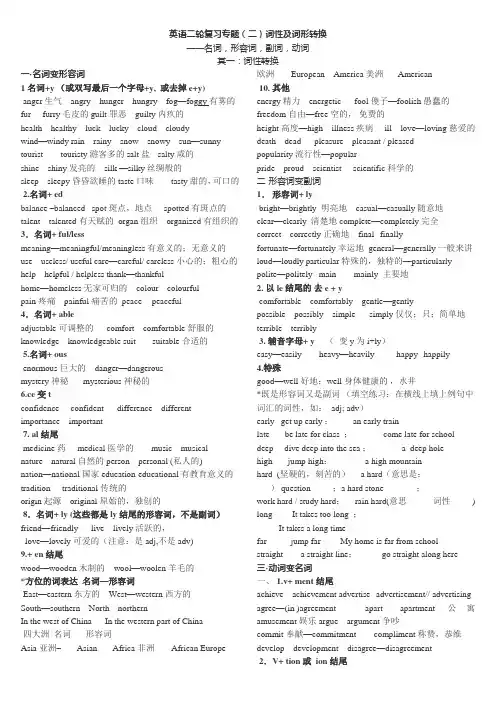
英语二轮复习专题(二)词性及词形转换——名词,形容词,副词,动词其一:词性转换一·名词变形容词1名词+y (或双写最后一个字母+y, 或去掉e+y)anger 生气---angry hunger---hungry fog—foggy有雾的fur----furry 毛皮的guilt 罪恶---guilty 内疚的health---healthy luck---lucky cloud---cloudy wind—windy rain---rainy snow---snowy sun—sunny tourist------touristy 游客多的salt 盐-- salty 咸的shine---shiny 发亮的silk —silky 丝绸般的sleep---sleepy 昏昏欲睡的taste 口味------tasty 甜的,可口的2.名词+ edbalance –balanced spot 斑点,地点----spotted 有斑点的talent---talented 有天赋的organ组织---organized 有组织的3.名词+ ful/lessmeaning—meaningful/meaningless 有意义的;无意义的use---useless/ useful care—careful/ careless 小心的;粗心的help---helpful / helpless thank—thankful home—homeless 无家可归的colour---colourfulpain 疼痛---painful 痛苦的peace -- peaceful4.名词+ ableadjustable 可调整的comfort---comfortable舒服的knowledge---knowledgeable suit -----suitable 合适的5.名词+ ousenormous 巨大的danger—dangerousmystery 神秘-----mysterious 神秘的6.ce 变 tconfidence----confident difference---different importance---important7. al 结尾medicine 药----medical 医学的music---musical nature---natural 自然的person---personal (私人的) nation—national 国家education-educational有教育意义的tradition----traditional 传统的origin起源---original 原始的,独创的8.名词+ ly (这些都是ly结尾的形容词,不是副词)friend—friendly live---lively 活跃的,love—lovely 可爱的(注意:是adj,不是adv)9.+ en 结尾wood—wooden 木制的wool—woolen 羊毛的*方位的词表达名词—形容词East—eastern东方的West—western西方的South—southern North---northernIn the west of China In the western part of China四大洲名词-----形容词Asia 亚洲–---- Asian Africa 非洲----- African Europe 欧洲----- European America 美洲-----American10. 其他energy精力---energetic fool 傻子—foolish 愚蠢的freedom 自由—free 空的,免费的height 高度—high illness 疾病--- ill love—loving 慈爱的death---dead pleasure---pleasant / pleasedpopularity 流行性—popularpride---proud scientist----scientific 科学的二·形容词变副词1.形容词+ lybright—brightly 明亮地casual—casually 随意地clear—clearly 清楚地complete—completely 完全correct---correctly 正确地final--finally fortunate—fortunately幸运地general—generally 一般来讲loud—loudly particular 特殊的,独特的—particularly polite—politely main------mainly 主要地2. 以le 结尾的去e + ycomfortable---comfortably gentle—gentlypossible---possibly simple ----simply 仅仅;只;简单地terrible---terribly3. 辅音字母+ y (变y为i+ly)easy—easily heavy—heavily happy--happily4.特殊good—well好地;well 身体健康的,水井*既是形容词又是副词(填空练习:在横线上填上例句中词汇的词性,如:adj; adv)early get up early ;____ an early train____late be late for class ;___ come late for school____ deep dive deep into the sea ;____ a deep hole_____ high jump high;______ a high mountain________ hard (坚硬的,刻苦的) a hard(意思是:___) question_____;a hard stone_______ ;work hard / study hard;___rain hard(意思______词性_____) long It takes too long ;_____It takes a long time_______far jump far ___My home is far from school _____ straight a straight line;_____go straight along here____ 三·动词变名词一、1.v+ ment 结尾achieve---achievement advertise--advertisement// advertising agree—(in )agreement apart------apartment 公寓amusement 娱乐argue---argument争吵commit奉献—commitment compliment 称赞,恭维develop---development disagree—disagreement2.V+ tion或ion 结尾attract吸引—attraction(s) conclude—conclusion 结论compete—competition 竞争,比赛discuss—discussion 讨论educate-----education describe—description描写,描绘suggest-建议,暗示-suggestion solve解决-solution 解决方法 3.V+ ance 结尾appear—appearance 外,出现perform--performance 演出4.V+ ing 结尾bathe 洗澡---bathing end 结束----ending 结尾,结局train 训练---training mean---meaning 意义say-----saying 谚语5.V+ 其他Beg(乞讨)—beggar 乞丐behave 行为,举止----behavior know---knowledge fly—flight 飞行heat 加热---heat 热量hit 撞击------hit 轰动一时的人或物,碰撞mix 混合-----mixture 混合物press 按,压—pressure 压力sit-----seat 座位succeed-- successtour 在-----旅游,在-----作巡回演出直接+地点,如:tour China ---tourism旅游/ tourist 游客其二·词形变化除了上述词性转换,一个单词的词形还可以通过以下方式来发生改变(顺便词性或词义也发生了变化):一·名词的单复数变形1.规则的可数名词的复数变化:1).一般情况加s :book-- books mouth---mouths house---houses girl---girls2).以s 、sh 、ch 、x结尾的加es :class--- classes box----boxes match----matches3).辅音字母+ y结尾的变y为i加es:city---cities country----countries party----parties factory----factories 4).以o 结尾的词+es的只有以下词:heroes Negroes;tomatoes;potatoes5) .以f,fe 结尾的变f或fe为v +es :thief wife life knife wolf half leaf2. 不规则的变化1).man—men, woman—women, tooth—teeth, foot—feet, goose—geese , child—children, mouse—mice, phenomenon---phenomena, crisis---crises; criterion---criteria 2).单复数相同: sheep, deer, fish, Chinese, Japanese , Swiss, craft, means, series, species3).以man, woman 修饰名词构成合成词时,两个词都变化.a man servant—three men servants 但boy与girl不要变化a girl student---three girl students4) 合成词的单数变复数,一般在词尾加-s/-es,如有名词作为中心词,则加在该名词后。
高中英语常考词性转换词
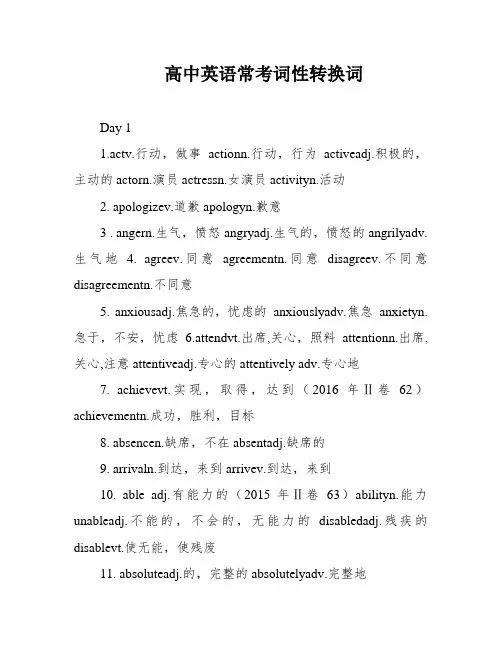
高中英语常考词性转换词Day 11.actv.行动,做事actionn.行动,行为activeadj.积极的,主动的actorn.演员actressn.女演员activityn.活动2. apologizev.道歉apologyn.歉意3 . angern.生气,愤怒angryadj.生气的,愤怒的angrilyadv.生气地 4. agreev.同意agreementn.同意disagreev.不同意disagreementn.不同意5. anxiousadj.焦急的,忧虑的anxiouslyadv.焦急anxietyn.急于,不安,忧虑6.attendvt.出席,关心,照料attentionn.出席,关心,注意attentiveadj.专心的attentively adv.专心地7. achievevt.实现,取得,达到(2016年Ⅱ卷62)achievementn.成功,胜利,目标8. absencen.缺席,不在absentadj.缺席的9. arrivaln.到达,来到arrivev.到达,来到10. able adj.有能力的(2015年Ⅱ卷63)abilityn.能力unableadj.不能的,不会的,无能力的disabledadj.残疾的disablevt.使无能,使残废11. absoluteadj.的,完整的absolutelyadv.完整地12. acceptvt.接受,认可acceptableadj.可接受的,合意的13.addv.增加,添加additionn.加,新增部分additionaladj.附加的,别的的14. admitv.允许…进入,接纳,承认admissionn.进入,接纳,承认15. advancev.增进,前进advancedadj.先进的,初级的16. advertisev.登广告,通知advertisementn.广告17. actualadj.实践上的(2014年I卷62)actuallyadv.实践上18. amusev.使开心,逗笑amusingadj.逗人发笑的amusementn.娱乐,乐趣19.announcev.公布,通告announcern.播音员announcementn.宣告,通告20.applyv.应用,申请,恳求applicantn.申请人applicationn.申请,应用,运用21.appearvi.出现appearancen.出现,面貌disappearvi.消失disappearancen.消失22. attract v.吸引(2017年I卷61)attraction n.吸引23. amaze v.使受惊(2014年I卷68)amazingadj.令人受惊的amazedadj.受惊的amazementn.受惊24. braveadj.勇敢的,无畏的bravelyadv.勇敢地braveryn.勇敢,大胆25.brightadj.明亮的,聪明的brightlyadv.明亮地,闪烁地brightnessn.明亮,聪明brightenv.发光,发亮26. basicadj.基础的,根本的basen.基础,根本,基地27. beautifullyadv.美丽地,漂亮地beautifuladj.美丽的,漂亮的beautyn.漂亮,美人29.believev.相believableadj.可的unbelievableadj.难于置的beliefn.仰,任30. buildv.建造/筑,建立buildingn.建筑(物),房屋Day 21.caren./v.谨慎,关心,照应(2017年I卷69)carefuladj.谨慎的,仔细的carefullyadv.仔细地carefulnessn.仔细carelessadj.大意的,随便的carelessnessn.大意大意2. celebratev.庆祝celebrationn.庆祝(会),庆典3. centren.中心,中央centraladj.中心的,中央的4. challengev.向……挑战challengingadj.具有挑战性的5. childn.儿童,孩子children(复数)n.孩子们childhoodn.童年,幼年时代6. colourn.颜色,色采colourfuladj.色采丰富的7. communicatev.交往,交际,传达communicationn.交际,交换,通petevi.合作,匹敌,比赛competitorn.敌手,竞赛者competitionn.合作,比赛9.confidentadj.自的,有心的confidentlyadv.自傲,自地confidencen.任,心10.considerv.考虑,细想considerateadj.体贴的.周到的considerationn.考虑,体谅11.correctv.改正,修改adj.正确的,恰当的correctlyadv.正确地,正当地correctionn.改正,修正incorrectadj.不正确的,错误的12. crowdn.人群v.拥挤,挤crowdedadj.拥挤的13.culturen,.文化,文明,修养culturaladj.文化上的,文明的culturallyadv.文化上,文明地14. curiousadj.好奇的curiouslyadv.好奇地,奇妙地curiosityn.好奇心,求知欲15. chemistn.化学家chemicaladj.化学的chemistryn.化学16. certainadj肯定的,当然的,有把握的(2017年Ⅲ卷70)certainlyadv.肯定地,有把握地17. choosev.选择choicen.选择18. concludev.推断,总结conclusionn.结论,总结conclusiveadj.决定性的19. completev.完成adj.完整的,完整completelyadv.完整地,完整地20. connectv.联系,连接connectionn.联系,连接fortv.安慰comfortableadj.舒适的,舒服的comfortablyadv.舒适地,舒服地uncomfortableadj.不舒服的Day 31.diev.死deathn.死亡deadadj.死的dyingadj.临死的deadlyadj.致命的2. distantadj.遥远的distancen.距离,遥远3. dirtn .脏,灰尘dirtyadj.脏的4.developv.发展,进展,培养(2016年Ⅲ卷68)developmentn.发展,进展developingadj.发展中的developedadj.发达的5. difficultadj.难的,不易的difficultyn.困难,难事6. darkadj.黑的darknessn.暗中7. directadj.直接directionn.方向,指示directlyadv.一直8. dangern.危险dangerousadj.危险的9. discussv.讨论,谈论discussionn.讨论,谈论10. discoverv.发现discoveryn.发现11.excitev.激动,兴奋excitedadj.感到激动/兴奋的excitingadj.令人激动/兴奋的excitedlyadv.激动地,兴奋地excitementn.激动,兴奋12. encouragevt.鼓励encouragementn.鼓励13. exactadj.精确的exactlyadv.正是,就是,确切14. enterv.进入,走入entrancen.入口,入学15. expressv.表示,表达expressionn.表示,表达16. easyadj.容易easilyadv.容易地17. explainv.解释,申明explanationn.解释,申明18. expectv.期待,预计expectationn.期待,预计19. editv.编辑,校订editorn.编辑editionn.版本,版20. educatev.教育,培养(2017年Ⅲ卷66)educatedadj.受过教育的,有教养的educationn.教育,培养21.employv.雇佣employern.雇佣者,老板employeen.雇员employmentn.雇佣22. equ设备;装备equipmentn.装.备,设备23. existv.存在existencen.存在;存在物24. failv.失败failuren.失败25. frightn.惊吓,害怕frightenv.吓唬frightenedadj.感到害怕的frighteningadj.令人害怕的26.freev.解放adj.免费的,自由的freedomn.自由freelyadv.自由自由地27. fooln./v.傻子,愚弄,棍骗foolishadj.愚蠢的28.fortunen.财产;运气fortunateadj.幸运的fortunatelyadv.幸运地unfortunatelyadj.不幸的是29. friendn.朋友friendlyadj.友好的friendshipn.交情,友情30.forgetv.遗忘forgetfuladj.健忘的,不留心的unforgettableadj.难以忘怀的,难忘的Day 41.graduatev./n.毕业,毕业生graduatedadj.大学毕业的,研究生的graduationn.毕业2.gradualadj.逐渐的(2016年Ⅲ卷66)graduallyadv.逐渐地3. gentleadj.温和,高雅,温柔gentlyadv.温和,高雅,温柔4. graten.感激gratefuladj.感激的,感谢的gratefullyad.感激地5. happyadj.荣幸的,兴奋的happilyadv.荣幸地,兴奋happinessn.荣幸,兴奋unhappyadj.不开心6.highadj/adv.高的/高高地heightn.高,高度7.healthn.安康healthyadj安康的healthilyadv.安康地unhealthyadj.不安康的8. harmv./n.风险,损害harmfuladj.有害的harmlessadj.无害的9. importantadj.重要的importancen.重要10. inventv.发明,创造inventionn.发明,创造11.interestn.乐趣,利益interesting的interestedadj.感到兴趣的adj.有趣的,引起兴趣12. imaginev.想象,设想imaginationn.想象,设想,想象力13. illadj.病的illnessn.疾病14. inventvt.创造,创造inventionn.创造,创造inventorn.创造家15.invitevt.约请,招待invitationn.约请,请帖16. judgen.裁判;法官v.判断,断定judgmentn.判断,断定17. introducev .介绍;引进(2017年Ⅱ卷69)introductionn.引进,介绍18. kindadj.善良,好心kindlyadv.好心地kindnessn.仁慈,和蔼19. lateadj. /adv.迟,晚lateradv.后来latestadj.最新的20.livev.生活,谋生,居住livelyadj.生动的,活泼的livingadj.活的,活着的lifen.生命21. lovev.爱,喜爱lovelyadj.心爱的22. leadv.领导,领先,首先leadern.领袖,领导人23. longadj.长,长的lengthn.长度lengthenv.加长24.luckn.运气,好运luckyadj.幸运的luckilyadv.幸运地unluckyadj.不幸运的unluckilyadv.不幸运地25. laughn.&v.笑laughtern.笑;笑声26. loudadj.大声的loudlyadv.大声地27.helpn./vt.帮助helpfuladj.有帮助的,有益的helplessadj.无助的28.hopen./vt.希望hopefula.有希望的;有出路的hopefullyadv.满怀希望地hopelessadj.没有希望的29. hungern.饥饿hungryadj.饥饿的Day51. mainadj.首要的mainlyadv.首要地,大部分2.managev.管理,经营,设法完成management营managern.经理3.meanv.意义,意思是meansn.方式meaningn.意思meaningfuladj.有意义的4. medicaladj.医学上的medicinen.医药5. mistaken.错误,弄错mistakenadj.错误的6. mixv.混合,搅和mixturen.混合物7. mountainn.山mountainousadj.多山的8.movev.移动,搬走movingadj.感人的movedadj.感动n.管理,经的movementn.移动,运动9.naturen.天然,本性,天性(2015年Ⅱ卷69)naturaladj.天然的,天然的naturallyadv.天然地,天然地10. nationn.国度nationaladj.国度的nationalityn.民族,国籍11. noisen.噪音,喧闹noisyadj.喧闹的12. operatev.动手术,操作operationn.手術,操作,开动13. officen.办公室,职务,职责officern.军官,官员officialadj.官方的,正式的(2016年I卷69)officiallyadv.官方地14. openv.开,开着的,开放的openingn.口,缝隙,开始15. obviousa.显然obviouslyad.显然地,明显地16. physicsn.物理,物资physicistn.物理学家physicaladj.身体的,物理的physicallyadv.身体17. pianon.钢琴pianistn.钢琴家18.pleasev.使人高兴,请pleasuren.愉快pleasedadj.高兴的pleasantadj.令人高兴的19. poisonn.毒药poisonousadj.有毒的20. pollutev.弄脏,污染pollutionn.弄脏,污染pollutedadj.受污染的21.possibleadj.可能地,也许possibly许possibilityn.可能性22.powern.力量,能力,权力powerfuladj.有力的,强大的powerfullyadv.強有力地23.practicen.实际,练习practisev.实践,练习practicaladj.实用的,实际的24. pressv.压,挤,按,pressuren.压力25. pronouncev.发音,读音pronunciationn.发音,读音26. personn.人personaladj.个人的,私人的personallyadv.个人以为personalityn.个性,个人27. peacen.和平,平静peacefuladj.和平的,平静的peacefullyadv.和平地,平静地28. punishv.惩罚,惩处punishmentn.惩罚,惩处29. painn.疼痛painfuladj.疼痛的painfullyadv.痛苦地30. patientn.病人adj.有耐心的patiencen.容忍;耐心adv.可能,或31.performv.表演,行动performern.表演者performancen.表演,表现Day61. realadj.真的reallyadv.真正,的确realityn.理想realizevt.实现,熟悉到2. recentadj.新近的,近来的recentlyadv.近来3.reasonn.理由,原因reasonable的reasonablyadv.合情公道地4. regular adj.规则的(2016年Ⅱ卷67)(2015年I卷69)regularly adv.规则地irregularadj.不规则的5. sadadj.难熬,悲哀,悲伤sadlyadv.难熬,悲哀,悲伤sadnessn.难熬,悲哀,悲伤6.safeadj.安全,平安safelyadv.安全,平安safetyn.安全,平安savev.挽救,节约7. satisfyv.使满足,满足satisfyingadj.令人满意的satisfiedadj.感到满意的satisfactionn.满足8. sciencen.科学scientistn.科学家scientificadj.科学的9. secretn./adj.秘密,秘密的secretlyadv.秘密地10.separatev.使分开adj.分离的,分开的separatelyad.单独地,各自地separationn.分离,分开,单独11.servev.服务,服役,开(饭),上(菜)servicen.服务,服役servantn.仆人,佣人adj.有道理的,合情公道12.silentadj.寂静的,安静,沉默silentlyadv.寂静地,安静,沉默silencen.寂静,安静,沉默13. simpleadj.简朴的,简朴simplyadv.简朴地,简朴14. slightadj.轻微的,微小slightlyadv.轻微地,微小15.slow adj.慢慢的(2015年Ⅱ卷65)slowly adv.慢慢地16. socialadj.社会的societyn.社会主义17.strongadj.强健的,健壮的stronglyadv.激烈地strengthn.气力,气力strengthenvt.加强,增强18.successn.成功,成就(2017年Ⅱ卷70)succeedv.成功,继续successfuladj.有成就successfullyadv.成功地19. suddenadj.突然的,忽然n.突然(2014年Ⅱ卷70)suddenlyadv.意外20. sureadj.确,有把握surelyadv.确实,一定,当然21. seriousa.严重的;认真的seriouslyad.认真地,严重地,严肃地22. techniquen.技术,技能,工艺technicaladj.技术上的23.terribleadj.可怕的,蹩脚的terriblyadv.可怕地,蹩脚地terrifiedadj.感触可怕的terrifyingadj.可怕的,可怕的24.thankv.谢谢,感谢,感激thanksn.谢谢,感谢,感激thankfuladj.感谢的,感激的25. tirev.使劳累,使疲劳tiringadj.劳累的,令人疲劳的tiredadj.厌倦的,累的26. trueadj.真的,真实的,真正的trulyadv.确实truthn.真理,真相ev.使用n.用途usefuladj.有用的uselessadj.无用的usedadj.用过的28. usualadj.平日,寻常usuallyadv.平日,寻常unusualadj.不寻常的,异常Day71.valuev./n.价值,益处,重要性valuableadj.有价值的,值钱的valuablen.值钱的东西2. visitv./n.访问,参观,看望visitorn.访问者,参观者。
人教版高中英语必修二 词性转换总结
新人教版必修二词性转换总结1.create→creativity→creative→creatively→creation→creator (v.→n.→adj.→adv.→n.→n.(人)) 创造→创造性→富有创造力的→创造性地说→创造物→创造者2.preserve→preservation→preserved (v.→n.→adj.)保护,保存→保护,保存→可保存的,防腐的3.promote→promotion→promotional (v.→n.→adj.) 促进,促销→促进,推广→促销的;增进的4.apply→application(app)→applicant (v.→n.→n.(人)) 申请,应用→申请,应用软件→申请者5.balance→balanced (n./v.→adj.) 平衡→平衡的6.propose→proposal (v.→n.) 提议→建议7.like→likely (prep/v.→adj./adv.) 像,喜欢→可能的/地8.establish→establishment (v.→n.) 建立,创立9.limit→limited→limitless (n./v.→adj.→adj.)限制→有限的→无限的10.contribute→contribution (v.→n.)贡献→贡献11.investigate→investigation(v.→n.)调查→调查12.conduct→conduction→conductor(v./n.→n.→n.(人)) 组织,安排,传导→传导→指挥,售票员13.appear→appearance→disappear→disappearance(v.→n.→反v.→n.)出现→出现→消失→消失14.profession→professional→professor(n.→adj./n.→n.(人))职业→专业的,专业人员→专家15.enter→entrance(v.→n.) 进入→入口16.forgive→forgiveness(v.→n.)原谅→原谅17.digit→digital(n.→adj.) 数字→数字的18.quality→qualify→qualified(n.→v.→adj.) 质量→达到标准,使有资格→有资格的19.tradition→traditional(n.→adj.)传统→传统的20.far→further→furthest(adj.→比较级→最高级)远的→更进一步→最大程度21.history→historic (n.→adj.)历史→历史(性)的;有历史记载的pare→comparison→comparative (v.→n.→adj.)比较→比较,对照→相对的23.identity→identify(n.→v.) 身份→确认24.post→poster→postman (v.→n.→n.(人))发布→海报→邮递员25.legal→legally→illegal→illegally(adj.→adv.→反adj.→adv.)合法的→合法地→非法的→非法地26.hunt→hunter (v.→n.(人))打猎→猎人27.immediate→immediately(adj.→adv.) 即刻的→立刻28.alarm→alarming→alarmed(v./n.→adj.→adj.)惊恐/警报→令人震惊的→担心害怕的29.rate→rating (n./v.→n.)速度/划分等级→等级,级别30.extinct→extinction (adj.→n.) 已灭绝的→灭绝31.aware→awareness (adj.→n.) 有……意识的→意识32.danger→endanger→dangerous→endangered (n.→v.→adj.→adj.) 危险→使遭危险;危及→危险的→濒临灭绝的33.concern→concerned→concerning (v.→adj.→prep.)关心,涉及→关注的,忧虑的→有关的34.live→lively→living→alive(v.→adj.→adj.→adj.) 居住→活跃的→居住的→活着的35.press→pressure (v.→n.)按压→压力36.reserve→reservation(v./n.→n.) 保留,保护区→预定37.observe→observation(v.→n.)观察,遵守→观察38.beauty→beautify→beautiful→beautifully (n.→v.→adj.→adv.)美→美化→美丽的→美丽地39.effect→effective→effectively→efficiency (n.→adj.→adv.→n.)效果→有效的→有效地→有效性40.recover→recovery(v.→n.) 康复→恢复41.remove→removal→remover(v.→n.→n.(人))开除,移开→免职,搬迁→搬运工42.intend→intention(打算,计划→意图,打算)43.threat→threaten(v.→n.)威胁44.exist→existence (v.→n.) 存在,生存45.harmony→harmonious(n.→adj.) 和谐→和谐的46.reduce→reduction(v.→n.)减少47.neighbor→neighborhood(adj.→n.) 临近的→附近48.emotion→emotional(n.→adj.) 感情→感情的ual→usually→unusual(adj.→adv.→反adj.) 通常的→通常地→不寻常的50.blog→blogger(n/v.→n.(人))博客,写博客→博主51.chat→chatting(n/v.→现在分词)闲聊52.convenient→convenience→inconvenient→inconvenience(adj.→n.反adj.→n.)方便的→方便→不方便的→不方便53.stick→stuck(v→adj.) 粘住→卡住的54.benefit→beneficial (n./v.→adj.)好处,获益→有好处的55.distance→distant(n.→adj.) 远方→距离远的56.inspire→inspiring→inspired→inspiration(v.→adj.→adj.→n.)激励,启发→鼓舞人心的→受到鼓舞的→激励,灵感57.access→accessible(n./v.→adj.) 通道/进入→可进入的58.tough→toughly (adj.→adv.)坚强的,坚固的,艰难的→坚强地,能吃苦耐劳地,固执地59.function→functional(n./v.→adj.) 功能,起作用→功能的60.account→accountable→accountant(n./v.→adj.→n.(人)) 账目,解释→有责任的→会计61.theft→thief(n.→n.(人))偷窃→小偷62.rude→rudely→rudeness(adj.→adv.→n.)粗鲁的→粗鲁地→粗鲁63.particular→particularly(adj.→adv.) 特定的→特别地64.embarrass→embarrassing→embarrassed→embarrassment (v.→adj.→adj.→n.)使尴尬→令人尴尬的→感到尴尬的→尴尬65.upset→upsetting (v./adj.→adj.) 打翻,难过的→令人心烦意乱的66.define→definition(v.→n.)阐明;限定;给……下定义→定义,释义67.puzzle→puzzling→puzzled(v.→adj.→adj.) 使迷惑→令人迷惑的→感到迷惑的68.defend→defence(v.→n.)防御,保卫69.surround→surrounding→surroundings(v.→adj.→n.) 包围→周围的→环境70.evident→evidence (adj.→n.)明显的→证据,证明71.achieve→achievement (v.→n.) 完成→成就72.locate→located→location (v→adj.→n.)确定……的位置→位于的→位置73.announce→announcement→announcer(v.→n.→n.(人)) 广播,宣布→通告,启事→广播员74.approach→approaching (v./n.→adj.) 接近,方法→接近的75.sure→ensure(adj.→v.)肯定的→确保76.generous→generously→generosity (adj.→adv.→n.)慷慨的→慷慨地→慷慨77.eager→eagerly→eagerness (adj.→adv.→n.)热切的,盼望的→渴望地,热切地→渴望,热心,热切78.poet→poem→poetry(n.→n.(人)→n.)诗歌-诗人→诗集79.greet→greeting(v.→n.)打招呼→问候80.crowd→crowded→uncrowded(n./v.→adj.→反adj.)人群,挤满→拥挤的→不拥挤的81.energy→energetic(n.→adj.)能源→积极的82.perform→performance→performer(v.→n.→n.(人))表现→表现→表演者83.able→enable→ability→unable(adj.→v.→n.→反adj.)有能力的→使有能力→能力→没有能力的84.origin→original→originally(n.→adj./n.→adv.) 起源→最初的,原稿→起初85.phenomenon→phenomena(n.单数→n.复数)现象86.gradual→gradually (adj.→adv.)逐渐的→逐渐地87.capable→capability (adj.→n.) 有能力的→能力88.relief→relieve (n.→v.) (痛苦或焦虑)减轻或消除,解脱→解除,缓解89.absorb→absorbing absorbed (v.→adj.→adj.)吸收,理解,吸引→吸引人的→专心的90.employ→employer→employee→employment→unemployment→employed(v.→n.(人)→n.(人)→n.→反n.→adj.)雇佣→雇主→雇员→雇佣→失业率→未被雇佣的91.aim→aimless(n/v→adj.)目标→无目标的92.equip→equipment→equipped(v.→n.→adj.)装备→装备→配备有的93.talent→talented(n.→adj.)天才→有天赋的94.assume→assumption(v.→n.)假设→假设95.add→addition (v.→n.)加→加法96.treat→treatment(v/n.→n.)对待,招待,处理→治疗,对待,乐趣97.satisfy→satisfactory→satisfied→satisfaction(v.→adj.→adj.→n.) 使满意→令人满意的→感到满意→满意98.vary→various→variety (v.→adj.→n.)变异,变化→各种各样的→种类的99.repeat→repetition(v.→n.) 重复→重复100.react→reaction (v.→n.) 作出反应→反应(能力),反对。
高中英语人教版新课标必修四词汇 词性转换()
必修四词性转换1.achieve--achievement (v--n)成绩--取得2.special--specially--specialist--specialize(adj--adv--n(人)--v) 特殊的/专门的--特殊地/专门地--专家--专攻3.connect--connection (v--n) 连接anize--organization (v--n)组织5.behave--behavior (v--n) 行为--举止6.observe--observation (v--n)观察/遵守7.respect--respectful (v--adj) 尊重--恭敬的8.argue--argument(v--n) 争论9.entertain--entertaining--entertainment (v--adj--n) 使娱乐--娱乐的--娱乐10.inspire--inspiring--inspired--inspiration (v--adj--adj--n) 鼓舞--令人鼓舞的--感到鼓舞的--鼓舞/灵感11.support--supportive--supporting(v--adj--adj) 支持--支持的--支撑的12.refer--reference--referring(v--n--现在分词) 参考--参考书目13.sick--sickness (adj--n) 病的/恶心的--疾病/恶心14.intend--intention (v--n)意图,打算15.determine--determined--determination(v--adj--n) 决定--下定决心的--决心16.kind--kindly--kindness--unkind(adj--adv--n--反adj) 友好的--友好地--友好--不友好的17.consider--considerate-considerable--consideration (v--adj--n) 考虑--考虑周到的--可考虑的--考虑18.hunger--hungry (n--adj) 饥饿--饿的19.disturb--disturbing--disturbed(v--adj--adj) 打扰,搅乱--引起烦恼的--被扰乱的20.expand--expansion (v--n)扩大,伸展21.circulate--circulation (v--n) 循环22.free--freedom (adj--n)自由的--自由23.equip--equipment--equipped(v--n--过去式) 装备24.nation--national--nationality-nationalism (n--adj--n--n) 国家--国家的--国籍--国家主义25.occupy--occupation (v--n) 占据26.person--personal--personality (n--adj--n) 人--个人的--个性27.confuse--confusing--confused--confusion (v--adj--adj--n)迷惑--令人迷惑的--感到迷惑的--迷惑28.regret--regretted (v--adj/过去式) 后悔--后悔的29.chemistry--chemical (n--adj) 化学--化学的an--organic (n--adj)器官--器官的31.fertile--fertilizer (adj--n)肥沃的--肥料32.produce--producer--production (v--n)生产33.mine--miner--mineral (n--n(人)--n) 矿--矿工--矿物34.discover--discovery (v--n) 发现35.skim--skimmer (v--n(人)) 浏览--泛读者36.industry--industrial (n--adj) 工业--工业的37.humor--humorous (n--adj) 幽默--幽默的38.bright--brightly--brighten (adj--adv--v)明亮的--明亮地--使更有希望39.depress--depressed--depression(v--adj--n)抑郁--抑郁的--抑郁40.perform--performer--performance(v--n(人)--n) 表演--表演者--表演41.astonish--astonishing--astonished--astonishment (v--adj--adj--n)使惊诧--令人惊讶的--感到惊讶的--惊讶42.fortune--fortunate--fortunately-unfortunate--unfortunately (n--adj--adj--反adj--adv)运气--幸运的--幸运地--不幸的--不幸地43.bore--boring--bored(n--adj--adj) 使无聊--令人无聊的--感到无聊的44.charm--charming (n/v--adj) 魅力/吸引--迷人的45.home--homeless (n--adj) 家--无家可归的46.wear--worn (v--adj) 穿--用坏的47.stiff--stiffly(adj--adv)僵硬的--僵硬地48.fail--failure (v--n)失败--失败(者)49.optimistic--optimism (adj--n) 乐观的--乐观50.mouth--mouthful (n--adj) 嘴巴--满嘴的51.enjoy--enjoyable--enjoyment (v--adj--n)享受--喜爱的--享受52.convince--convincing--convinced (v--adj--adj) 相信--令人相信的--坚信的53.direct--directly--direction (adj/v--adv--n) 直接的/导演--直接地--方向54.confident--confidently--confidence (adj--adv--n) 自信的--自信地--自信55.particular--particularly (adj--adv)特殊的--特殊地56.occasion--occasional--occasionally (n--adj--adv) 时刻/场合--偶然的--偶然地57.amuse--amusing--amused--amusement (v--adj--adj--n) 使发笑--好笑的--被逗笑的--愉快58.explain--explanation (v--n)解释59.mountain--mountainous(n--adj) 山--多山的60.react--reaction (v--n) 反应61.drink--drunk (v--adj) 喝--喝醉的62.state--statement (v--n)陈述63.greet--greeting(v--n )问候64.represent--representation (v--n ) 代表--表现65.associate--association (v--n ) 联合--社团/联系66.curious--curiously-- curiosity (adj--adv--n) 好奇的--好奇地--好奇67.approach--approaching (v--adj) 接近--接近的68.defend--defence (v--n) 防御69.understand--understanding--misunderstand--misunderstanding (v--n/adj--反v--n/adj)理解--理解(的)--误解--误解(的)70.simple--simply (adj--adv) 简单的--简单地71.speak--speaker--spoken--unspoken (v--n(人)--adj--反adj)说话--演讲者--口语的--非口语的72.face--facial (n--adj) 脸--面部的73.function--functional (n/v--adj )作用--起作用的74.true--truly--truth (adj--adv--n)真的--真地--事实75.anger--angry (n--adj) 生气--生气的76.subject--subjective (n--adj)科目,主观--主观的77.hug--hugged (v--过去式) 拥抱78.center--central (n--adj)中心--中央的79.vary--various--variety (v--adj--n) 变异--各种各样的--种类80.attract--attractive--attracted--attraction(v--adj--adj--n)吸引--吸引人的--被吸引的--吸引人的事物81.tour--tourist--tourism (n--n(人)--n) 观光旅游--游客--旅游业82.engine--engineer 引擎--工程师83.preserve--preservation(v--n) 保存84.long--length--lengthen (adj--n--v) 长的--长度--使加长85.settle--settler--settlement (v--n(人)--n) 定居/解决--移民--解决86.translate--translation--translator (v--n--n(人)) 翻译--翻译--翻译家87.dive--diver(v--n(人)) 潜水--潜水的人88.create--creature--creative--creation--creator (v--n--adj--n--n(人)) 创造--生物--创造的--创造物--创造者89.advance--advanced (v/n--adj) 前进,提前--先进的90.admit--admission(v--n) 承认,允许。
高中英语词汇词性转换
高中英语词汇词性转换1. ability (n. )能力;才能---able (a.) ---unable (a..) --- disability (n. ) --- disabled (a.)be able to do…= be capable of doing2. absence (n. ) 缺席;不在--- absent (a.) ---present (a..) --- presence (n.)be absent from; be present at3. absolute (a.) 绝对的;完全的---absolutely (adv.)4. abundant (a.) 丰富的;充裕的---abundance (n.) be abundant in5. academic (a.) 学院的,理论的(n.) 大学教师---academy (n.) 学院6. accept (v.) 接受---acceptable (a.)可接受的-- – refuse (opp.) 拒绝7. access (n.) 通路,入门;(v.)接近;存取---accessible (a.)have access to(to 为介词)可以使用;可以接触8. accurate (a.) 正确的,精确的--- accuracy (n.) --- accurately (adv.) --- (opp.) inaccurate 不准确9. achieve (v.) 取得,达到--- achievement (n.)10. acquire (v.) 获得,学到--- acquisition (n.)11. act (n. ) 法令,条例;(v.)表演;行动---action (n.) –-- active (a.) 主动的--- inactive (a.) --- actively(adv.) --- activity (n. ) 活动---passive (a.) 被动的---actor (n.) --- actress (n.)12. actual (a.) 实际的;现实的--- actually (adv.) = as a matter of fact13. adapt (v.) 使适应;改编---adaptation (n.) 适应,顺应;改编,改编本---adaptable (a.) 有适应能力的adapt oneself to 适应于; adapt…(for sth.) from sth. 改编14. add (v.) 添加,增加;补充说- --addition (n.) --- additional (a.) –additionally (adv.)add…to 将…(添)加到… add to 增加,加强add up 加起来add up to 共计达in addition (to) 另外,除此之外15. addict (n.) 成瘾的人-- addicted (a.) -- addition (n.) -- addictive (a.) 使成瘾的; 上瘾的; 易令人沉溺的be addicted to (to 为介词)对…上瘾16. adjust (v.) 调整,使适应--- adjustment (n.) --- adjustable (a.)17. admire (v.) 钦佩,羡慕--- admiration (n.) --- admirable (a.)18. admit (v.) 承认,准许( admitted, admitted) --- admission (n.)19. adopt (v.) 收养,采用--- adoption (n.) --- adopted (a.)20. advance (v.) 推进,促进;前进(n.)前进,提升--- advanced (a.) 先进的; 高等的21. advantage (n.) 有点;好处--- disadvantage (n.) take advantage of 利用;欺骗,占…的便宜22. adventure (n.) 冒险,奇遇--- adventurous (a.)23. advertise (v.) 为…做广告---advertisement (n.)24. advise (v.) 建议,劝告----adviser (n.) 顾问,忠告者--- -- advice (n.) a piece of advice25. affect (v.) 影响--- affection (n.) 影响,感情have an effect on26. Africa (n.) 非洲--- African (a.) (n.)27. age (n.) 年纪--- aged (a.) 老年的--- elderly (a.)28. agree (v.) 同意--- agreement (n.) --- disagree (opp) --- disagreement (n.)29. agriculture (n.) 农业--- agricultural (a.)30. allow (v.) 准许,允许---allowance (n.) 允许;紧贴,补助31. amaze (v.) 惊奇,震惊--- amazement (n.) ---amazed (a.) --- amazing (a.) to one’s amazement32. ambition (n.) 抱负,雄心---ambitious (a.)33. amuse (v.) 使…快乐--- amusement (n.) – amused (a.) --- amusing (a.) to one’s amusement34. analyze (v.) 分析--- analysis (n.)35. anger (n.) 愤怒--- angry (a.)36. announce (v.) 宣布, 宣告--- announcement (n.) --- announcer (n.)37. annoy (v.) 使烦恼– annoyed (a.) --- annoying (a.) ---annoyance (n.) to one’s annoyance38. annual (a. ) 一年一次的,每年的(n.)年刊--- annually (a.)39. anxious (a.) 忧虑的,焦急的--- anxiety (n.)40. apologize (v.) 道歉--- apology (n.)apologize to sb. for sth.= make an apology to sb. for sth.因…事向某人道歉41. appear (v.) 出现---appearance (n.)外貌,外观;出现,露面42. apply (v.) 申请, 应用--- application (n.) 申请表---applicant (n.) 申请人--- applied (a.) 应用的43. appoint (v.) 约定,任命--- appointment (n.) ---make an appointment 约会44. appreciate (v.) 欣赏,感激--- appreciation (n.)45. approve (v.) 批准,同意--- approval (n.) of…赞成(opp.) disapprove (v.) 不赞成disapprove of…46. argue (v.) 争辩,辩论--- argument (n.)47. arrange (v.) 安排--- arrangement (n.)48. arrive (v.) 到达--- arrival (n.)49. Asia (n.) 亚洲---Asian (a.) (n.)50. assess (v.) 评价,估价--- assessment (n.)51. assist (v.) 帮助,协助--- assistance (n.) 帮助,援助--- assistant (n.) 助手,助理52. associate (v.) 联系,交往--- association (n.) --- associated (a.)53. assume (v.) 假定,采取--- assumption (n.)54. astonish (v.) 使惊讶--- astonished (a.) --- astonishing (a.) – astonishment (n.)55. astronaut (n.) 宇航员--- astronomy (n.) 天文学---astronomer (天文学家)56. athlete (n.) 运动员--- athletic (a.) 运动员的;运动的;体格健壮的;行动敏捷的57. attend (v.)参加,照料-- attendance (n.)出席,参加---attender (n.) 出席者;参加者58. attention (n) 注意,专心--- attentive (a) --- attentively (adv.)59. attract (v.) 吸引--- attraction (n.) --- attractive (a.)60. aware (a.) 知道的,明白的--- awareness (n.) be aware of61. bacterium (n.) 细菌---(pl. ) bacteria62. bad (a.) 坏的--- badly (adv. ) (worse, worst) ---good (a.) --- well (a.) (adv.) (better, best)63. base (n.) 基地,根据地(v.) 以…为基地--- basic (adj.) --- basically 大体上--- basis (n.) 基础,要素--- (pl.) bases64. bath (n.) 洗澡,浴室--- bathe (v.) --- bathroom (n.) --- bathtub (n.) 澡盆65. bear (v.) 忍受(bore, borne) --- bearable (a.) 可忍受的--- unbearable (opp.) 不可忍受的66. beat (v.) 敲打,跳动,打赢(beat, beaten)67. beautiful (a.) 美丽的--- beauty (n. ) --- beautify (v.)68. behave (v.) 行为,守规矩--- behavior (n.)69. belief (n) 信条,信念---(pl.)beliefs-- believe (v.) --- believable (a.) ---(opp.) unbelievable70. begin (v.) 开始,着手(began, begun) --- beginning (n.)71. bend v. 使弯曲(bent, bent)be bent on doing 一心想/决心要做…72. benefit n. 利益, 好处vt. 有益于, 有助于--- beneficial adj.有益的, 受益的benefit from…从…中受益;be beneficial to 对…有益73. bitter adj.苦的, 痛苦的, 怀恨的--- unpleasant adj 不愉快的;讨厌的74. boring adj. 无聊的,乏味的(修饰物) ---bored adj.无聊的, 无趣的, 烦人的(用于人)75. botany n.植物学--- botanical adj.植物学的76. brave adj.勇敢的---bravery n.勇敢---coward n.懦弱的人, 胆小的人77. boycott n./vt. 联合抵制, 排斥78. breath n. 呼吸, 气息---breathe v.呼吸, 发出--- breathless adj. 气喘吁吁的79. bring vt. 拿来, 带来---brought(分去式)---brought(过去分词)80. bury vt.埋葬, 掩埋, 隐藏---buried(过去式或过去分词) be buried in sth 埋头做某事81. business n.商业, 买卖, 交易, 生意---businessman --- businesswoman82. calculate v.计算, 考虑, 计划, 打算--- calculation n.计算, 考虑---calculator n.计算机, 计算器83. calm adj.(天气、海洋等)静的, 镇静的, v. (使)平静, (使)镇定, 平息--- calmness n.平静, 冷静, 镇静84. care n.注意, 照料, vi.关心, 顾虑, 照顾, 喜爱vt.在意---careful(a.) --- careless (a.)85. catch v.捕获, 赶上(车船等), 发觉, 感染(疾病)--- (caught, caught)86. caution n.小心, 谨慎, 警告vt.警告---cautious adj. 小心的,谨慎的87. celebration n.庆祝, 庆典---celebrate v.庆祝88. certain adj. 确定的, 某一个--- certainly adv. --- certainty n. --- uncertainty n.无常, 不确定89. challenge n.挑战vt.向...挑战--- challenging adj.具有挑战性的90. change n.改变, 变化, 找回的零钱vt.改变, 变革--- changeable adj.可改变的91. character n. 人物,特点,性格,品质--- characteristic n. 特性,特征92. chemical adj.化学的n.化学制品, 化学药品--- chemist n.化学家, 药剂师--- chemistry n.化学93. choice n.选择, 抉择, 精选品--- choose v.选择, 选定(chose, chosen)94. cloth n.布, 织物, 衣料--- clothes n.衣服, [总称]被褥,各种衣服--- clothing n.(总称)衣服95. collect vt. 收集--- collection n. 收藏, 征收, 搜集品,捐款--- collective adj.集体的n.集体96. comfort n.安慰, 舒适vt.安慰--- comfortable adj.舒适的97. communicate v.沟通, 交流,传达--- communication n.98. compete vi.比赛, 竞争--- competition n.竞争, 竞赛--- competitor n.竞争者--- competitive adj.竞争的;有竞争力的;(指人)好竞争的99. conclude v.作出结论vt.推断--- conclusion n. 结论100. confident adj.自信的, 确信的--- confidence n.信心--- confidently adv.信赖地, 安心地101. conduct n.行为, 操行v. 组织, 实施,管理--- conductor n. (乐队)指挥102. crazy adj.疯狂的--- craze n.狂热,疯狂;风行一时的东西;be crazy about 对…疯狂/着迷;like crazy 拼命地;发疯似地103. create vt.创造,产生(syn.)--- creative adj --- creation n. 创造,创建--- creativity n.创造力--- creator n.创造者;创作者create jobs/opportunities/ a good image/ wealth104. crime n.罪犯--- criminal n.罪犯commit a crime 犯罪105. cross vt.穿过--- crossing n.十字路口--- crossroads n.交叉路口at the crossroads 106. crowd n. 人群vt. 拥挤--- crowded adj. 拥挤的--- crowdedness n.107. cruel adj. 残忍的,残酷的--- be cruel to sb --- cruelly adv.--- cruelty n. 残忍108. culture n.文化--- cultural adj.cultural difference (shock) 文化差异;文化冲击multi-culture 多元文化109. cure n&v. 治疗;医好---a cure for cancer ----cure sb of one’s disease/one’s habit110. curious adj. 好奇的;奇异的(about/to do sth)--- curiosity n.好奇心;求知欲satisfy one’s curiosity 满足好奇心---out of curiosity 出于好奇111. cycle vi 骑自行车;循环--- recycle v.再循环,回收再用--- cyclist n.骑自行车的人112. damage n&vt 毁坏,损害do /cause damage to 对...造成损害113. danger n. 危险--- dangerous adj. 危险的--- endanger vt 使……濒临危险endangered animals 濒危动物be in danger/be at risk 处于危险中114. dead. adj.死的---death n. 死亡---deadly adj.致命的---die v.死亡---dying adj.垂死的, 渴望的the dead/living 死的/活着的…… cause many deaths and injuries 造成很多伤亡be dying for sth./to do sth 渴望做某事115. decide n.决定--- decisive adj. 决定性的decision n. make a decision 做出决定116. declare vt.声明;断言--- declaration n. declare war on/against Japan 像日本宣战117. decorate vt. 装饰,修饰--- decoration n. be decorated with118. decline n&v.下降,婉拒I offered to give them a lift but they declined .119. decrease/increase n&v. 减少/增加increase/decrease to/by 20%120. defend vt. 防守,保卫--- defense in defense of 为保护某人为……辩护121. deliberate adj. --- deliberately adv. 故意地on purpose122. delight n 快乐;乐事--- delighted adj. be delighted with/by/at sb/sth take delight in 喜欢,以……为乐delight sb 使某人高兴to one’s delight 使某人高兴的是123. deliver vt.投递,接生,发表讲话--- delivery deliver parcels/ a baby/ a speech n.124. depend vi 依赖;依靠--- dependent adj. --- independence n.独立--- independent adj.独立的depend on sb 依赖的be dependent on sb be independent from/of sb125. deep adj/adv. 深的--- deeply adj.深深的--- depth n. 深度--- deepen v.加深far/deep into the night 深夜be deeply moved/touched/affectedStill water runs deep.静水流深/大智若愚126. describe vt.描述,描写description n. give a description of sth127 design vt.设计n.图案,图样--- designer 设计师be designed to 设计的目的是,计划是128. desperate adj.不顾一切的;绝望的--- desperation n.绝望be desperate for/to do sth 极渴望129. destroy vt.破坏,毁坏--- destruction n.destroyed buildings 被毁的建筑物cause destruction to sth130. determine vt.决定,决心--- determination n. 决心be determined to do 决心做131. develop v. 发展,使发达,开发冲洗(照片)--- development n. develop a new product with the development of developing world/developed world develop an interest in sth 132. devote vt. 把…… 奉献于--- devotion n.忠心,奉献精神;be devoted to sb 挚爱某人,对……全心全意devote oneself/one’s life/one’s energy/time to sth/doing sth133. differ vi. --- different adj. --- difference n. make a difference (to) 有影响,改变;大有作为differ from sth in …在什么方面不同于…tell the difference between A and B134. difficult adj. --- difficulty n. 困难with/without difficulty,have difficulty with sth./(in) doing sth 做某事有困难135. direct adj.直接的--- (反) 间接的---direct v. 指导, 导演--- director n. 导演---direction n.方向indirect speech 间接引语in the direction of 朝…方向136. disable v.使……残疾---disabled adj.残疾的---disability n. help the disabled 帮助残疾人The traffic accident disabled him.137. disappear vi. 消失(反)--- appear ---disappearance n. --- (反) appearance138. disagree with sb on/about/over sth --- disagreement ----be in disagreement with139. disappoint vt.使……失望--- disappointment n. to one’s disappointment 令某人失望的是make sb disappointed ;sb. be/feel disappointed with sb./at sth. 某人对…感到失望140. discover vt.发现--- discovery n. make a discovery141. discrimination n.歧视--- discriminate vt.歧视,区分discriminate A from B 把…区分开来discriminate against women 歧视妇女142. discuss vt --- discussion n.讨论143. distance n.距离--- distant adj.远的,遥远的in the distance 在远方keep sb at a distance 疏远某人,与某人保持距离144. distinguish v.辨别distinguish A from B /distinguish between A and B 区别/辨别…145. distinction n 差别;名声--- distinct adj. 可辨别的;有区别的;不同的--- distinctly adv. 146. distribute v.分布,分配--- distribution n. 分配--- distribute sth to /among sb 把…分发/分配给…147. disturb vt.打扰;扰乱---disturbed adj.心神不宁的,心烦意乱的--- disturbing adj.引起烦恼的;令人不安的Don’t disturb the papers on my desk. a disturbing piece of news.148. donate v.捐赠…--- donation n. donate sth to sb 将…捐给He donated 10,000$ to the earthquake disaster area. A donation of 200$ 二百美元的捐款149. educate v.教育--- educator 教育者--- education n.receive a good education 受到良好的教育150. effect n.效果,作用effective adj.有效果的affect v. 影响have an effect on ---take effect 起到作用,有效果come into effect 生效;奏效151. elect v. --- election n.选举He was elected president of the USA in 1986.152. electricity n. 电--- electric adj.电的--- electrical adj. 电器的--- electronic adj. 电子的electric wire 电线electrical engineering 电气工程electronic equipment153. embarrass v. 使…… 尴尬--- embarrassed adj. --- embarrassing adj. 令人尴尬的,难为情的--- embarrassment n. be embarrassed about 对…感到尴尬154. employ v.雇佣--- employer n. 雇主,老板--- employee n. 雇工,雇员--- employment n. 雇用,使用,职业--- unemployment n. 失业155. courage n.勇气--- encourage v.鼓励--- discourage vt. 使……泄气--- encouragement n. 鼓励encourage sb to do sth 鼓励某人做某事discourage sb from doing 劝阻某人不做某事156. energy n.精力,能量--- energetic adj.精力旺盛的be full of energy=be energetic 157. enjoy vt. 欣赏,喜欢;享受…之乐趣---enjoyable adj.愉快的;---enjoyment n.享受;令人愉快的事物enjoy equality (freedom, peace) enjoy doing有趣的Children like to share interests and enjoyments with their parents.158. entertain v.招待, 款待; 使…有兴趣; 使快乐--- entertainment n.娱乐活动--- entertaining adj.有趣的,使人愉快的159. environment n.环境--- environmental adj. --- environmentalist n.环境学家environmental protection/conservation / preservation 环境保护160. equal adj.平等的vt. 等于--- equally adv. --- equality n. be equal to 等同;胜任treat sb equally the principle of equality before the law 法律面前人人平等的原则161. equip vt.提供设备;装备--- equipment (UC) n. a piece of equipment be equipped with Our office is equipped with modern equipment.162. escape n/vi 逃跑;被忘掉escape from being punished (punishment)a narrow escape 九死一生an escaped prison 一名逃跑的犯人163. Europe n.欧洲--- European adj.欧洲的n.欧洲人a European 一名欧洲人164. evident adj.明显的--- evidence n.证据,迹象The. police haven’t found out the c onvincing evidence.165. exam(examination) n.考试, 测验---examine v. 检查,调查, 考试With the approach of the college entrance examination, I study harder and harder.166. excellent adj.卓越的, 极好的--- excellence n.优秀,卓越, 优点, 美德167. exhibit vt. 展览; n.展品--- exhibition n.展览,展览会Visitors are requested not to touch exhibits in the museum.There will be an exhibition on next week in the science museum.168. exist vi.存在--- existence n.生存,存在--- existing adj 现存的,现行的come into existence 开始存在existing laws 现行法律Does life exist on other planets?169. expect vt.预料,盼望;认为--- expectation n. 期望,预期expect sb to do I’m expecting your early reply.Don’t expect too much from your child. 不要对你的孩子期望太高。
高中英语2025届高考词性转换整理(共160组)
28.adjust(v.)适应;使适应
adjustment(n.)适应
[ə'dʒʌst]
29.administration(n.)管理
administrator(n.)管理人
administrate(vt.)管理
[ədmɪnɪ'streɪʃən]
30.admire(v.)钦佩;羡慕
disadvantage(n.)缺点;弊端
[əd'vɑ:ntɪdʒ]
37.adventure(n.)冒险
adventurous(adj.)冒险的
adventurist(n.) 冒险主义者
[əd'ventʃə]
38.advertise(vt.)登广告;为……做广告
advertisement(n.)广告
[ə'fekt]
42.agent(n.)代理人
agency(n.)代理处
['eɪdʒənt]
43.aggressive(adj.)侵略性的;好斗的
aggression(n.)侵略
['əɡresɪБайду номын сангаас]
44.agree(v.)同意
agreeable(adj.)同意的;接受的
agreement(n.)同意
33.adopt(v.)①收养;领养 ②采纳;采用
adoption(n.)①收养;领养②采纳;采用
[ə'dɔpt]
34.adore(v.)崇拜
adoration(n.)崇拜
[ə'dɔ:]
35.advance(v.)使前进;增进
advanced(adj.)高级的
[əd'vɑ:ns]
- 1、下载文档前请自行甄别文档内容的完整性,平台不提供额外的编辑、内容补充、找答案等附加服务。
- 2、"仅部分预览"的文档,不可在线预览部分如存在完整性等问题,可反馈申请退款(可完整预览的文档不适用该条件!)。
- 3、如文档侵犯您的权益,请联系客服反馈,我们会尽快为您处理(人工客服工作时间:9:00-18:30)。
浅谈英语构词法(转)掌握英语构词法是高中学生应该具备的一项基本技能。
它对于帮助学生扩大词汇量,准确地推测文章中词汇的含义具有非常重要的意义。
现就英语中常见的三种构词法加以总结说明。
一. 转化:指由一种词性转化为另一种词性的构词形式。
1. 名词转化为动词:book (n 书—v 预定);seat (n 座位—v 使就位;落座);water (n 水—v 浇水);shoulder (n 肩膀—v 负责任)2. 动词转化为名词:try (v 尝试—n 尝试);look (v 看—n 表情);swim (v 游泳—n 游泳);dream (v 做梦—n 梦)3. 形容词转化为动词:dirty (adj 脏的—v 弄脏);slow (adj 慢的—v 放慢;减慢);right (adj 正确的—v 纠正);dry (adj 干的—v 变干);free (adj 自由的—v 解放;使自由);wrong (adj 错误的—v 弄错;受委屈)4. 形容词转化为名词:dear (adj 昂贵的—n 喜欢的人/ 物);quiet (adj 寂静的—n 寂静);total (adj 全部的—n 总数)5. 其它词类的转化情况:Our classroom faces south. (south:n 南方;南面—adv 向南;朝南)6. 当英语词汇转化时,转化后的词的读音常有变化。
二. 合成:指由两个或两个以上本身有独立含义的词合在一起组成一个有具体意义的新词的构词形式。
1. 合成形容词的常见构词形式:⑴数词+ 名词a five - year plan (五年计划);first-class products (一级品);second-hand goods (二手货);a four-word (四字成语)⑵数词+ 名词+eda three - legged bench (三条腿的登子);a one - eyed camel (一只眼的骆驼)⑶数词+ 名词+ 形容词a 20-year-old lady (一位20 岁的女士);a 1,000-metre-long bridge (一座1000 米长的桥)⑷名词+ 现在分词peace-loving (热爱和平的);meat-eating (食肉的);English-speaking (说英语的);history-making (创造历史的)⑸名词+ 过去分词heart-broken (伤心的);man-made (人造的);state-owned (国有的);water-covered (被水覆盖的)⑹形容词+ 名词+edabsent-minded (漫不经心的);blue-eyed (蓝眼睛的);good-tempered (好脾气的);kind-hearted (和善的)⑺形容词+ 现在分词bad-looking (相貌丑陋的);fine-sounding (动听的);easy-going (容易相处的)⑻形容词+ 名词short-term (短期的);part-time (兼职的);high-class (高级的);large-scale (大规模的)⑼副词+ 现在分词hard-working (努力工作的);far-reaching (深远的);ever-lasting (永恒的)⑽副词+ 过去分词well-developed (高度发达的);well-known (著名的);well-trained (训练有素的)⑾其他构词形式的合成形容词all-round (全面的);face-to-face (面对面的);thank-you (感谢的);out-of-date (过时的)2. 合成名词的常见构成形式:①名词+ 名词silkworm (蚕);footprint (脚印);newspaper (报纸);glasshouse (温室);bedroom (卧室)②名词+ 动名词handwriting (书法);sun-bathing (日光浴);sight-seeing (观光)③形容词+ 名词shorthand (速记);hotline (热线);blackboard (黑板)④动名词+ 名词waiting-room (候车室);sleeping-pill (安眠药);writing-desk (写字台);reading-room (阅览室)⑤动词+ 名词pickpocket (扒手);post office (邮局);playground (操场);break-water (防波堤)⑥动词+ 副词get-together (联欢会);break-through (突破);take-off (起飞);lookout (岗哨)⑦副词+ 动词downfall (垮台);overthrow (推翻);outbreak (爆发);income (收入;所得)⑧其他构成形式的合成名词well-being (福利);good-for-nothing (无用之人);by-product (副产品);touch-me-not (含羞草);self-improvement (自我完善);self-criticism (自我批评)注意:合成词如果出现复数形式时通常在其后加-s 或-es ,如by-products,reading-rooms,但应特别注意:passers-by,lookers-on 等词语是在其表达该词中心含义的词上加-s 或-es .3. 合成动词及其他合成词类:overthrow (推翻);sleep-walk (梦游);undergo (经历);everything (一切);furthermore (而且);forever (永远);maybe (也许)三. 派生:指由一个词根加上前缀和(或)后缀构成另一个词的构词形式。
1. 前缀:一般而言,前缀只改变词的含意,并不改变词的词性,有些前缀如en- ,under- 等却使原词改变了词性,如force (n 力量)—enforce (v 加强);rich (adj 富有)—enrich (v 使富裕);line (n 线)—underline (v 在……之下画线)。
①表示否定意义的前缀,往往使原词变成它的反义词。
前缀含义词根派生词dis- 不like (喜欢)dislike (不喜欢)un- 不fair (公平)unfair (不公平)il- 不;无legal (合法的)illegal (非法的)in- 不;非correct (正确的)incorrect (不正确的)im- 非possible (可能的)impossible (不可能的)ir- 不;非regular (规则的)irregular (不规则的)non- 无;非smoker (烟民)non-smoker (不吸烟者)en- 使courage (勇气)encourage (鼓励)fore- 前;预先head (头)forehead (前额)inter- 在……之间national (国家的)international (国际的)kilo- 千meter (米)kilometer (千米)micro- 微量的;微小的computer (计算机)microcomputer (微机)mid- 在…中间autumn (秋天)mid-autumn (中秋)mis- 错误地understand (理解)misunderstand (误解)over- 在…上,过分;超过head (头)overhead (在头顶上的)re- 再;重;又build (修建)rebuild (重建)seimi- 半circle (圆)semicircle (半圆)2. 后缀:通常情况下,后缀不但改变词,还改变词性,常见的后缀有动词后缀、副词后缀、形容词后缀和名词后缀。
①动词后缀:后缀含义词根派生词-en 变得…wide (宽的)widen (加宽;变宽)-ify 使…beauty (美)beautify (使漂亮)-ize/ise 使…real(的)realize (实现)②副词后缀:后缀含义词根派生词-ly 在…状态中happy (高兴;幸福)happily (高兴地;幸福地)-ward 朝…方向/地方back (后)backward (向后;朝后)③形容词后缀:后缀含义词根派生词-able/-ible 可…的;能…的comfort (舒服)comfortable (舒适的)-al/-ial 属于…的;有…特点practice (练习)practical (实际的;可行的)-ed 有…特性的interest (兴趣)interested (感兴趣的)-ful 充满…的harm (伤害;损伤)harmful (有害的;致伤的)-ish 有…属性的self (自己)selfish (自私的)-ive 有…倾向的create (创造)creative (创造性的)④名词后缀:后缀含义词根派生词-ance/-ence 指行为、状态perform (表演)performance (演出;表演)-dom 指性质、状态free (自由的)freedom (自由)-er/or 指人的身份work (工作)worker (工人)-ess 指人的身份host (招待;主持)hostess (女主人)-ese 表示国籍China (中国)Chinese (中国人)-ian 指人的身份music (音乐)musician (音乐家)-ism 与主义有关的social (社会的)socialism (社会主义)名词后缀1)-or/er/ess/crat/cis:做某件事情或职业的人或物:worker, debtor2)-acy, 表示\"性质,状态,境遇\" democracy, accuracy, diplomacy3)-ance, -ence表示\"性质,状况,行为,过程,总量,程度”importance, diligence, difference, obedience4)-ancy, -ency, 表示\"性质,状态,行为,过程\" frequency, urgency, efficiency,5)-bility, 表示\"动作,性质,状态\" possibility, flexibility, feasibility,6)-dom, 表示\"等级,领域,状态\" freedom, kingdom, wisdom7)-hood, 表示\"资格,身份, 年纪,状态\" childhood, manhood, falsehood8)-ion, -sion, -tion, -ation, -ition, 表示\"行为的过程,结果,状况\" action, solution, conclusion, destruction, expression, correction9)-ism, 表示\"制度,主义,学说,信仰,行为\" socialism, criticism, colloquialism, heroism10)-ity, 表示\"性质,状态,程度”purity, reality, ability, calamity11)-ment, 表示\"行为,状态,过程,手段及其结果treatment, movement, judgment, punishment, argument12)-ness, 表示\"性质,状态,程度\" goodness, kindness, tiredness, friendliness13)-ship, 表示\"情况,性质,技巧,技能及身份,职业”hardship, membership, friendship14)-th, 表示\"动作,性质,过程,状态\" depth, wealth, truth, length, growth15)-tude, 表示\"性质,状态,程度\" latitude, altitude(海拔)16)-ure, 表示\"行为,结果\" exposure, pressure, failure, procedure(手续),17-grapy, 表示\"……学,写法”biography, calligraphy, geography18)-ic, ics, 表示\"……学……法\" logic, mechanics, electronics, linguistics19)-ology, 表示\"……学……论”biology, zoology, technology(工艺学)20)-nomy, 表示\"……学……术\" astronomy, economy, bionomy(生态学)2. 形容词后缀(1)带有“属性,倾向,相关”的含义1)-able, -ible, visible, flexible2)名词-ish, foolish, bookish, selfish(注意accomplish, vanish)3)-ive, active, sensitive, productive4)-like, manlike, childlike5)名词-ly, manly, fatherly, scholarly, motherly6)-some, troublesome, handsome7)-ful, beautiful, wonderful, helpful, truthful8)-ous, dangerous, generous, courageous, various9)-ent, violent10)-most, foremost, topmost11)less, 表示否定,countless, stainless, wireless3. 动词后缀1)-ize, ise, 表示\"做成,变成,……化“modernize, mechanize, democratize, organize2)-en, 表示\"使成为,引起,使有”quicken, weaken, soften, harden3)-fy, 表示\"使……化, 使成”beautify, purify, intensify, signify, simplify4)-ish, 表示\"使,令”finish, abolish, diminish, establish5)-ate, 表示“成为……,处理,作用”separate, operate, indicate4. 副词后缀(形容词)-ly:bad→badly坏地/恶劣地,careful→carefully小心地-wise(OE):clock→clockwise(a./adv.)顺时针方向的(地);like→likewise同样地-wards:out→outwards向外面地,north→northwards向北方地。
